
Research Topics & Ideas: CompSci & IT
50+ Computer Science Research Topic Ideas To Fast-Track Your Project

Finding and choosing a strong research topic is the critical first step when it comes to crafting a high-quality dissertation, thesis or research project. If you’ve landed on this post, chances are you’re looking for a computer science-related research topic , but aren’t sure where to start. Here, we’ll explore a variety of CompSci & IT-related research ideas and topic thought-starters, including algorithms, AI, networking, database systems, UX, information security and software engineering.
NB – This is just the start…
The topic ideation and evaluation process has multiple steps . In this post, we’ll kickstart the process by sharing some research topic ideas within the CompSci domain. This is the starting point, but to develop a well-defined research topic, you’ll need to identify a clear and convincing research gap , along with a well-justified plan of action to fill that gap.
If you’re new to the oftentimes perplexing world of research, or if this is your first time undertaking a formal academic research project, be sure to check out our free dissertation mini-course. In it, we cover the process of writing a dissertation or thesis from start to end. Be sure to also sign up for our free webinar that explores how to find a high-quality research topic.
Overview: CompSci Research Topics
- Algorithms & data structures
- Artificial intelligence ( AI )
- Computer networking
- Database systems
- Human-computer interaction
- Information security (IS)
- Software engineering
- Examples of CompSci dissertation & theses
Topics/Ideas: Algorithms & Data Structures
- An analysis of neural network algorithms’ accuracy for processing consumer purchase patterns
- A systematic review of the impact of graph algorithms on data analysis and discovery in social media network analysis
- An evaluation of machine learning algorithms used for recommender systems in streaming services
- A review of approximation algorithm approaches for solving NP-hard problems
- An analysis of parallel algorithms for high-performance computing of genomic data
- The influence of data structures on optimal algorithm design and performance in Fintech
- A Survey of algorithms applied in internet of things (IoT) systems in supply-chain management
- A comparison of streaming algorithm performance for the detection of elephant flows
- A systematic review and evaluation of machine learning algorithms used in facial pattern recognition
- Exploring the performance of a decision tree-based approach for optimizing stock purchase decisions
- Assessing the importance of complete and representative training datasets in Agricultural machine learning based decision making.
- A Comparison of Deep learning algorithms performance for structured and unstructured datasets with “rare cases”
- A systematic review of noise reduction best practices for machine learning algorithms in geoinformatics.
- Exploring the feasibility of applying information theory to feature extraction in retail datasets.
- Assessing the use case of neural network algorithms for image analysis in biodiversity assessment
Topics & Ideas: Artificial Intelligence (AI)
- Applying deep learning algorithms for speech recognition in speech-impaired children
- A review of the impact of artificial intelligence on decision-making processes in stock valuation
- An evaluation of reinforcement learning algorithms used in the production of video games
- An exploration of key developments in natural language processing and how they impacted the evolution of Chabots.
- An analysis of the ethical and social implications of artificial intelligence-based automated marking
- The influence of large-scale GIS datasets on artificial intelligence and machine learning developments
- An examination of the use of artificial intelligence in orthopaedic surgery
- The impact of explainable artificial intelligence (XAI) on transparency and trust in supply chain management
- An evaluation of the role of artificial intelligence in financial forecasting and risk management in cryptocurrency
- A meta-analysis of deep learning algorithm performance in predicting and cyber attacks in schools

Topics & Ideas: Networking
- An analysis of the impact of 5G technology on internet penetration in rural Tanzania
- Assessing the role of software-defined networking (SDN) in modern cloud-based computing
- A critical analysis of network security and privacy concerns associated with Industry 4.0 investment in healthcare.
- Exploring the influence of cloud computing on security risks in fintech.
- An examination of the use of network function virtualization (NFV) in telecom networks in Southern America
- Assessing the impact of edge computing on network architecture and design in IoT-based manufacturing
- An evaluation of the challenges and opportunities in 6G wireless network adoption
- The role of network congestion control algorithms in improving network performance on streaming platforms
- An analysis of network coding-based approaches for data security
- Assessing the impact of network topology on network performance and reliability in IoT-based workspaces

Topics & Ideas: Database Systems
- An analysis of big data management systems and technologies used in B2B marketing
- The impact of NoSQL databases on data management and analysis in smart cities
- An evaluation of the security and privacy concerns of cloud-based databases in financial organisations
- Exploring the role of data warehousing and business intelligence in global consultancies
- An analysis of the use of graph databases for data modelling and analysis in recommendation systems
- The influence of the Internet of Things (IoT) on database design and management in the retail grocery industry
- An examination of the challenges and opportunities of distributed databases in supply chain management
- Assessing the impact of data compression algorithms on database performance and scalability in cloud computing
- An evaluation of the use of in-memory databases for real-time data processing in patient monitoring
- Comparing the effects of database tuning and optimization approaches in improving database performance and efficiency in omnichannel retailing
Topics & Ideas: Human-Computer Interaction
- An analysis of the impact of mobile technology on human-computer interaction prevalence in adolescent men
- An exploration of how artificial intelligence is changing human-computer interaction patterns in children
- An evaluation of the usability and accessibility of web-based systems for CRM in the fast fashion retail sector
- Assessing the influence of virtual and augmented reality on consumer purchasing patterns
- An examination of the use of gesture-based interfaces in architecture
- Exploring the impact of ease of use in wearable technology on geriatric user
- Evaluating the ramifications of gamification in the Metaverse
- A systematic review of user experience (UX) design advances associated with Augmented Reality
- A comparison of natural language processing algorithms automation of customer response Comparing end-user perceptions of natural language processing algorithms for automated customer response
- Analysing the impact of voice-based interfaces on purchase practices in the fast food industry

Topics & Ideas: Information Security
- A bibliometric review of current trends in cryptography for secure communication
- An analysis of secure multi-party computation protocols and their applications in cloud-based computing
- An investigation of the security of blockchain technology in patient health record tracking
- A comparative study of symmetric and asymmetric encryption algorithms for instant text messaging
- A systematic review of secure data storage solutions used for cloud computing in the fintech industry
- An analysis of intrusion detection and prevention systems used in the healthcare sector
- Assessing security best practices for IoT devices in political offices
- An investigation into the role social media played in shifting regulations related to privacy and the protection of personal data
- A comparative study of digital signature schemes adoption in property transfers
- An assessment of the security of secure wireless communication systems used in tertiary institutions
Topics & Ideas: Software Engineering
- A study of agile software development methodologies and their impact on project success in pharmacology
- Investigating the impacts of software refactoring techniques and tools in blockchain-based developments
- A study of the impact of DevOps practices on software development and delivery in the healthcare sector
- An analysis of software architecture patterns and their impact on the maintainability and scalability of cloud-based offerings
- A study of the impact of artificial intelligence and machine learning on software engineering practices in the education sector
- An investigation of software testing techniques and methodologies for subscription-based offerings
- A review of software security practices and techniques for protecting against phishing attacks from social media
- An analysis of the impact of cloud computing on the rate of software development and deployment in the manufacturing sector
- Exploring the impact of software development outsourcing on project success in multinational contexts
- An investigation into the effect of poor software documentation on app success in the retail sector
CompSci & IT Dissertations/Theses
While the ideas we’ve presented above are a decent starting point for finding a CompSci-related research topic, they are fairly generic and non-specific. So, it helps to look at actual dissertations and theses to see how this all comes together.
Below, we’ve included a selection of research projects from various CompSci-related degree programs to help refine your thinking. These are actual dissertations and theses, written as part of Master’s and PhD-level programs, so they can provide some useful insight as to what a research topic looks like in practice.
- An array-based optimization framework for query processing and data analytics (Chen, 2021)
- Dynamic Object Partitioning and replication for cooperative cache (Asad, 2021)
- Embedding constructural documentation in unit tests (Nassif, 2019)
- PLASA | Programming Language for Synchronous Agents (Kilaru, 2019)
- Healthcare Data Authentication using Deep Neural Network (Sekar, 2020)
- Virtual Reality System for Planetary Surface Visualization and Analysis (Quach, 2019)
- Artificial neural networks to predict share prices on the Johannesburg stock exchange (Pyon, 2021)
- Predicting household poverty with machine learning methods: the case of Malawi (Chinyama, 2022)
- Investigating user experience and bias mitigation of the multi-modal retrieval of historical data (Singh, 2021)
- Detection of HTTPS malware traffic without decryption (Nyathi, 2022)
- Redefining privacy: case study of smart health applications (Al-Zyoud, 2019)
- A state-based approach to context modeling and computing (Yue, 2019)
- A Novel Cooperative Intrusion Detection System for Mobile Ad Hoc Networks (Solomon, 2019)
- HRSB-Tree for Spatio-Temporal Aggregates over Moving Regions (Paduri, 2019)
Looking at these titles, you can probably pick up that the research topics here are quite specific and narrowly-focused , compared to the generic ones presented earlier. This is an important thing to keep in mind as you develop your own research topic. That is to say, to create a top-notch research topic, you must be precise and target a specific context with specific variables of interest . In other words, you need to identify a clear, well-justified research gap.
Fast-Track Your Research Topic
If you’re still feeling a bit unsure about how to find a research topic for your Computer Science dissertation or research project, check out our Topic Kickstarter service.
You Might Also Like:

Investigating the impacts of software refactoring techniques and tools in blockchain-based developments.
Steps on getting this project topic
I want to work with this topic, am requesting materials to guide.
Information Technology -MSc program
It’s really interesting but how can I have access to the materials to guide me through my work?
That’s my problem also.
Investigating the impacts of software refactoring techniques and tools in blockchain-based developments is in my favour. May i get the proper material about that ?
BLOCKCHAIN TECHNOLOGY
I NEED TOPIC
Submit a Comment Cancel reply
Your email address will not be published. Required fields are marked *
Save my name, email, and website in this browser for the next time I comment.
- Print Friendly

PhD in Computer Science Topics 2023: Top Research Ideas

The Pros and Cons of Owning an Auto Shop
If you want to embark on a PhD in computer science , selecting the right research topics is crucial for your success. Choosing the appropriate thesis topics and research fields will determine the direction of your research. When selecting thesis topics for your research project, it is crucial to consider the compelling and relevant issues. The topic selection can greatly impact the success of your project in this field.
We’ll delve into various areas and subfields within computer science research , exploring different projects, technologies, and ideas to help you narrow your options and find the perfect thesis topic. Whether you’re interested in computer science research topics like artificial intelligence , data mining , cybersecurity , or any other cutting-edge field in computer science engineering, we’ve covered you with various research fields and analytics.
Stay tuned as we discuss how a well-chosen topic can shape your research proposal, journal paper writing process, thesis writing journey, and even individual chapters. We will address the topic selection issues and analyze how it can impact your communication with scholars. We’ll provide tips and insights to help research scholars and experts select high-quality topics that align with their interests and contribute to the advancement of knowledge in technology. These tips will be useful when submitting articles to a journal in the field of computer science.
Top PhD research topics in computer science for 2024

Exploration of Cutting-Edge Research Areas
As a Ph.D. student in computer science, you can delve into cutting-edge research areas such as technology, cybersecurity, and applications. These fields are shaping the future of deep learning and the overall evolution of computer science. One such computer science research field is quantum computing , which explores the principles of quantum mechanics to develop powerful computational systems. It is an area that offers various computer science research topics and has applications in cybersecurity. By studying topics like quantum algorithms and quantum information theory, you can contribute to advancements in this exciting field. These advancements can be applied in various applications, including deep learning techniques. Moreover, your research in this area can also contribute to your thesis.
Another burgeoning research area is artificial intelligence (AI) . With the rise of deep learning and the increasing integration of AI into various applications, there is a growing need for researchers who can push the boundaries of AI technology in cybersecurity and big data. As a PhD student specializing in AI, you can explore deep learning, natural language processing, and computer vision and conduct research in the field. These techniques have various applications and require thorough analysis. Your research could lead to breakthroughs in autonomous vehicles, healthcare diagnostics, robotics, applications, deep learning, cybersecurity, and the internet.
Discussion on Emerging Fields
In addition to established research areas, it’s important to consider emerging fields, such as deep learning, that hold great potential for innovation in applications and techniques for cybersecurity. One such field is cybersecurity. With the increasing number of cyber threats and attacks, experts in the cybersecurity field are needed to develop robust security measures for the privacy and protection of internet users. As a PhD researcher in cybersecurity, you can investigate topics like network security, cryptography, secure software development, applications, internet privacy, and thesis. Your work in the computer science research field could contribute to safeguarding sensitive data and protecting critical infrastructure by enhancing security and privacy in various applications.
Data mining is an exciting domain that offers ample opportunities for research in deep learning techniques and their analysis applications. With the rise of cloud computing, extracting valuable insights from vast amounts of data has become crucial across industries. Applications, research topics, and techniques in cloud computing are now essential for uncovering valuable insights from the data generated daily. By focusing your PhD studies on data mining techniques and algorithms, you can help organizations make informed decisions based on patterns and trends hidden within large datasets. This can have significant applications in privacy management and learning.
Bioinformatics is an emerging field that combines computer science with biology and genetics, with applications in big data, cloud computing, and thesis research. As a Ph.D. student in bioinformatics, you can leverage computational techniques and applications to analyze biological data sets and gain insights into complex biological processes. The thesis could focus on the use of cloud computing for these analyses. Your research paper could contribute to advancements in personalized medicine or genetic engineering applications. Your thesis could focus on learning and the potential applications of your findings.
Highlighting Interdisciplinary Topics
Computer science intersects with cloud computing, fog computing, big data, and various other disciplines, opening up avenues for interdisciplinary research. One such area is healthcare informatics, where computer scientists work alongside medical professionals to develop innovative solutions for healthcare challenges using cloud computing and fog computing. The collaboration involves the management of these technologies to enhance healthcare outcomes. As a PhD researcher in healthcare informatics, you can explore electronic health records, medical imaging analysis, telemedicine, security, learning, management, and cloud computing. Your work in healthcare management could profoundly impact improving patient care and streamlining healthcare systems, especially with the growing importance of learning and implementing IoT technology while ensuring security.
Computational social sciences is an interdisciplinary field that combines computer science with social science methodologies, including cloud computing, fog computing, edge computing, and learning. Studying topics like social networks or sentiment analysis can give you insights into human behavior and societal dynamics. This learning can be applied to mobile ad hoc networks (MANETs) security management. Your research on learning, security, cloud computing, and IoT could contribute to understanding and addressing complex social issues such as online misinformation or spreading infectious diseases through social networks.
Guidance on selecting thesis topics for computer science PhD scholars
Importance of aligning personal interests with current trends and gaps in existing knowledge.
Choosing a thesis topic is an important decision for computer science PhD scholars , especially in IoT. It is essential to consider topics related to learning, security, and management to ensure a well-rounded research project. It is essential to align personal interests with current trends in learning, management, security, and IoT and fill gaps in existing knowledge. By choosing a learning topic that sparks your passion for management, you are more likely to stay motivated throughout the research process on the cutting edge of IoT. Aligning your interests with the latest advancements in cloud computing and fog computing ensures that your work in computer science contributes to the field’s growth. Additionally, staying updated on the latest developments in learning and management is essential for your professional development.
Conducting thorough literature reviews is vital to identify potential research gaps in the field of learning management and security. Additionally, it is important to consider the edge cases and scenarios that may arise. Dive into relevant academic journals, conferences, and publications to understand current research in learning management, security, and mobile. Look for areas with limited studies or conflicting findings in security, fog, learning, and management, indicating potential gaps that need further exploration. By identifying these learning and management gaps, you can contribute new insights and expand the existing knowledge on security and fog.
Tips on Conducting Thorough Literature Reviews to Identify Potential Research Gaps
When conducting literature reviews on mobile learning management, it is important to be systematic and comprehensive while considering security. Here are some tips for effective mobile security management and learning. These tips will help you navigate this process effectively.
- Start by defining specific keywords related to your research area, such as security, learning, mobile, and edge, and use them when searching for relevant articles.
- Utilize academic databases like IEEE Xplore, ACM Digital Library, and Google Scholar for comprehensive cloud computing, edge computing, security, and machine learning coverage.
- Read abstracts and introductions of articles on learning, security, blockchain, and cloud computing to determine their relevance before diving deeper into full papers.
- Take notes while learning about security in cloud computing to keep track of key findings, methodologies used, and potential research gaps.
- Look for recurring themes or patterns in different studies related to learning, security, and cloud computing that could indicate areas needing further investigation.
By following these steps, you can clearly understand the existing literature landscape in the fields of learning, security, and cloud computing and identify potential research gaps.
Consideration of Practicality, Feasibility, and Available Resources When Choosing a Thesis Topic
While aligning personal interests with research trends in security, learning, and cloud computing is crucial, it is equally important to consider the practicality, feasibility, and available resources when choosing a thesis topic. Here are some factors to keep in mind:
- Practicality: Ensure that your research topic on learning cloud computing can be realistically pursued within your PhD program’s given timeframe and scope.
- Feasibility: Assess the availability of necessary data, equipment, software, or other resources required for learning and conducting research effectively on cloud computing.
- Consider whether there are learning opportunities for collaboration with industry partners or other researchers in cloud computing.
- Learning Cloud Computing Advisor Expertise: Seek guidance from your advisor who may have expertise in specific areas of learning cloud computing and can provide valuable insights on feasible research topics.
Considering these factors, you can select a thesis topic that aligns with your interests and allows for practical implementation and fruitful collaboration in learning and cloud computing.
Identifying good research topics for a Ph.D. in computer science

Strategies for brainstorming unique ideas
Thinking outside the box and developing unique ideas is crucial when learning about cloud computing. One effective strategy for learning cloud computing is to leverage your personal experiences and expertise. Consider the challenges you’ve faced or the gaps you’ve noticed in your field of interest, especially in learning and cloud computing. These innovative research topics can be a starting point for learning about cloud computing.
Another approach is to stay updated with current trends and advancements in computer science, specifically in cloud computing and learning. By focusing on emerging technologies like cloud computing, you can identify areas ripe for exploration and learning. For example, topics related to artificial intelligence, machine learning, cybersecurity, data science, and cloud computing are highly sought after in today’s digital landscape.
Importance of considering societal impact and relevance
While brainstorming research topics, it’s crucial to consider the societal impact and relevance of your work in learning and cloud computing. Think about how your research in cloud computing can contribute to learning and solving real-world problems or improving existing systems. This will enhance your learning in cloud computing and increase its potential for funding and collaboration opportunities.
For instance, if you’re interested in learning about cloud computing and developing algorithms for autonomous vehicles, consider how this technology can enhance road safety, reduce traffic congestion, and improve overall learning. By addressing pressing issues in the field of learning and cloud computing, you’ll be able to contribute significantly to society through your research.
Seeking guidance from mentors and experts
Choosing the right research topic in computer science can be overwhelming, especially with the countless possibilities within cloud computing. That’s why seeking guidance from mentors, professors, or industry experts in computing and cloud is invaluable.
Reach out to faculty members who specialize in your area of interest in computing and discuss potential research avenues in cloud computing with them. They can provide valuable insights into current computing and cloud trends and help you refine your ideas based on their expertise. Attending computing conferences or cloud networking events allows you to connect with professionals with firsthand knowledge of cutting-edge research areas in computing and cloud.
Remember that feedback from experienced individuals in the computing and cloud industry can help you identify your chosen research topic’s feasibility and potential impact.
Tools and simulation in computer science research
Overview of popular tools for simulations, modeling, and experimentation.
In computing and cloud, utilizing appropriate tools and simulations is crucial for conducting effective studies in computer science research. These computing tools enable researchers to model and experiment with complex systems in the cloud without the risks associated with real-world implementation. Valuable insights can be gained by simulating various scenarios in cloud computing and analyzing the outcomes.
MATLAB is a widely used tool in computer science research, which is particularly valuable for computing and working in the cloud. This software provides a range of functions and libraries that facilitate numerical computing, data visualization, and algorithm development in the cloud. Researchers often employ MATLAB for computing to simulate and analyze different aspects of computer systems, such as network performance or algorithm efficiency in the cloud. Its versatility makes computing a popular choice across various domains within computer science, including cloud computing.
Python libraries also play a significant role in simulation-based studies in computing. These libraries are widely used to leverage the power of cloud computing for conducting simulations. Python’s extensive collection of libraries offers researchers access to powerful tools for data analysis, machine learning, scientific computing, and cloud computing. With libraries like NumPy, Pandas, and TensorFlow, researchers can develop sophisticated models and algorithms for computing in the cloud to explore complex phenomena.
Network simulators are essential in computer science research, specifically in computing. These simulators help researchers study and analyze network behavior in a controlled environment, enabling them to make informed decisions and advancements in cloud computing. These computing simulators allow researchers to study communication networks in the cloud by creating virtual environments to evaluate network protocols, routing algorithms, or congestion control mechanisms. Examples of popular network simulators in computing include NS-3 (Network Simulator 3) and OMNeT++ (Objective Modular Network Testbed in C++). These simulators are widely used for testing and analyzing various network scenarios, making them essential tools for researchers and developers working in the cloud computing industry.
The Benefits of Simulation-Based Studies
Simulation-based studies in computing offer several advantages over real-world implementations when exploring complex systems in the cloud.
- Cost-Effectiveness: Conducting large-scale computing experiments in the cloud can be prohibitively expensive due to resource requirements or potential risks. Simulations in cloud computing provide a cost-effective alternative that allows researchers to explore various scenarios without significant financial burdens.
- Cloud computing provides a controlled environment where researchers can conduct simulations. These simulations enable them to manipulate variables precisely within the cloud. This level of control in computing enables them to isolate specific factors and study their impact on the cloud system under investigation.
- Rapid Iteration: Simulations in cloud computing enable researchers to iterate quickly, making adjustments and refinements to their models without the need for time-consuming physical modifications. This agility facilitates faster progress in research projects .
- Scalability: Computing simulations can be easily scaled up or down in the cloud to accommodate different scenarios. Researchers can simulate large-scale computing systems in the cloud that may not be feasible or practical to implement in real-world settings.
Application of Simulation Tools in Different Domains
Simulation tools are widely used in various domains of computer science research, including computing and cloud.
- In robotics, simulation-based studies in computing allow researchers to test algorithms and control strategies before deploying them on physical robots. The cloud is also utilized for these simulations. This approach helps minimize risks and optimize performance.
- For studying complex systems like traffic flow or urban planning, simulations in computing provide insights into potential bottlenecks, congestion patterns, or the effects of policy changes without disrupting real-world traffic. These simulations can be run using cloud computing, which allows for efficient processing and analysis of large amounts of data.
- In computing, simulations are used in machine learning and artificial intelligence to train reinforcement learning agents in the cloud. These simulations create virtual environments where the agents can learn from interactions with simulated objects or environments.
By leveraging simulation tools like MATLAB and Python libraries, computer science researchers can gain valuable insights into complex computing systems while minimizing costs and risks associated with real-world implementations. Using network simulators further enhances their ability to explore and analyze cloud computing environments.
Notable algorithms in computer science for research projects

Choosing the right research topic is crucial. One area that offers a plethora of possibilities in computing is algorithms. Algorithms play a crucial role in cloud computing.
PageRank: Revolutionizing Web Search
One influential algorithm that has revolutionized web search in computing is PageRank, now widely used in the cloud. Developed by Larry Page and Sergey Brin at Google, PageRank assigns a numerical weight to each webpage based on the number and quality of other pages linking to it in the context of computing. This algorithm has revolutionized how search engines rank webpages, ensuring that the most relevant and authoritative content appears at the top of search results. With the advent of cloud computing, PageRank has become even more powerful, as it can now analyze vast amounts of data and provide accurate rankings in real time. This algorithm played a pivotal role in the success of Google’s computing and cloud-based search engine by providing more accurate and relevant search results.
Dijkstra’s Algorithm: Finding the Shortest Path
Another important algorithm in computer science is Dijkstra’s algorithm. Named after its creator, Edsger W. Dijkstra, this computing algorithm efficiently finds the shortest path between two nodes in a graph using cloud technology. It has applications in various fields, such as network routing protocols, transportation planning, cloud computing, and DNA sequencing.
RSA Encryption Scheme: Securing Data Transmission
In computing, the RSA encryption scheme is one of the most widely used algorithms in cloud data security. Developed by Ron Rivest, Adi Shamir, and Leonard Adleman, this asymmetric encryption algorithm ensures secure communication over an insecure network in computing and cloud. Its ability to encrypt data using one key and decrypt it using another key makes it ideal for the secure transmission of sensitive information in the cloud.
Recent Advancements and Variations
While these computing algorithms have already left an indelible mark on computer science research projects , recent advancements and variations continue expanding their potential cloud applications.
- With the advent of machine learning techniques in computing, algorithms like support vector machines (SVM), random forests, and deep learning architectures have gained prominence in solving complex problems involving pattern recognition, classification, and regression in the cloud.
- Evolutionary Algorithms: Inspired by natural evolution, evolutionary algorithms such as genetic algorithms and particle swarm optimization have found applications in computing, optimization problems, artificial intelligence, data mining, and cloud computing.
Exploring emerging trends: Big data analytics, IoT, and machine learning
The computing and computer science field is constantly evolving, with new trends and technologies in cloud computing emerging regularly.
Importance of Big Data Analytics
Big data refers to vast amounts of structured and unstructured information that cannot be easily processed using traditional computing methods. With the rise of cloud computing, handling and analyzing big data has become more efficient and accessible. Big data analytics in computing involves extracting valuable insights from these massive datasets in the cloud to drive informed decision-making.
With the exponential growth in data generation across various industries, big data analytics in computing has become increasingly important in the cloud. Computing enables businesses to identify patterns, trends, and correlations in the cloud, leading to improved operational efficiency, enhanced customer experiences, and better strategic planning.
One significant application of big data analytics is in computing research in the cloud. By analyzing large datasets through advanced techniques such as data mining and predictive modeling in computing, researchers can uncover hidden patterns or relationships in the cloud that were previously unknown. This allows for more accurate predictions and a deeper understanding of complex phenomena in computing, particularly in cloud computing.
The Potential Impact of IoT
The Internet of Things (IoT) refers to a network of interconnected devices embedded with sensors and software that enable them to collect and exchange data in the computing and cloud fields. This computing technology has the potential to revolutionize various industries by enabling real-time monitoring, automation, and intelligent decision-making in the cloud.
Computer science research topics in computing, including IoT and cloud computing, open up exciting possibilities. For instance, sensor networks can be deployed for environmental monitoring or intrusion detection systems in computing. Businesses can leverage IoT technologies for optimizing supply chains or improving business processes through increased connectivity in computing.
Moreover, IoT plays a crucial role in industrial computing settings, facilitating efficient asset management through predictive maintenance based on real-time sensor readings. Biometrics applications in computing benefit from IoT-enabled devices that provide seamless integration between physical access control systems and user authentication mechanisms.
Enhancing Decision-Making with Machine Learning
Machine learning techniques are leading the way in technological advancements in computing. They involve computing algorithms that enable systems to learn and improve from experience without being explicitly programmed automatically. Machine learning is a branch of computing with numerous applications, including natural language processing, image recognition, and data analysis.
In research projects, machine learning methods in computing can enhance decision-making processes by analyzing large volumes of data quickly and accurately. For example, deep learning algorithms in computing can be used for sentiment analysis of social media data or for predicting disease outbreaks based on healthcare records.
Machine learning also plays a vital role in automation. Autonomous vehicles heavily depend on machine learning models for computing sensor data and executing real-time decisions. Similarly, industries can leverage machine learning techniques in computing to automate repetitive tasks or optimize complex business processes.
The future of computer science research
We discussed the top PhD research topics in computing for 2024, provided guidance on selecting computing thesis topics, and identified good computing research areas. Our research delved into the tools and simulations utilized in computing research. We specifically focused on notable algorithms for computing research projects. Lastly, we touched upon emerging trends in computing, such as big data analytics, the Internet of Things (IoT), and machine learning.
As you embark on your journey to pursue a PhD in computing, remember that the field of computer science is constantly evolving. Stay curious about computing, embrace new computing technologies and methodologies, and be open to interdisciplinary collaborations in computing. The future of computing holds immense potential for groundbreaking discoveries that can shape our world.
If you’re ready to dive deeper into the world of computing research or have any questions about specific computing topics, don’t hesitate to reach out to experts in the computing field or join relevant computing communities where computing ideas are shared freely. Remember, your contribution to computing has the power to revolutionize technology and make a lasting impact.
What are some popular career opportunities after completing a PhD in computer science?
After completing a PhD in computer science, you can explore various career paths in computing. Some popular options in the field of computing include becoming a university professor or researcher, working at renowned tech companies as a senior scientist or engineer, pursuing entrepreneurship by starting your own tech company or joining government agencies focusing on cutting-edge technology development.
How long does it typically take to complete a PhD in computer science?
The duration of a Ph.D. program in computing varies depending on factors such as individual progress and program requirements. On average, it takes around four to five years to complete a full-time computer science PhD specializing in computing. However, part-time options may extend the duration.
Can I specialize in multiple areas within computer science during my PhD?
Yes! Many computing programs allow students to specialize in multiple areas within computer science. This flexibility in computing enables you to explore diverse research interests and gain expertise in different subfields. Consult with your academic advisor to plan your computing specialization accordingly.
How can I stay updated with the latest advancements in computer science research?
To stay updated with the latest advancements in computing, consider subscribing to relevant computing journals, attending computing conferences and workshops, joining online computing communities and forums, following influential computing researchers on social media platforms, and participating in computing research collaborations. Engaging with the vibrant computer science community will inform you about cutting-edge computing developments.
Are there any scholarships or funding opportunities available for PhD students in computer science?
Yes, numerous scholarships and funding opportunities are available for PhD students in computing. These computing grants include government agency grants, university or research institution fellowships, industry-sponsored computing scholarships, and international computing scholarship programs. Research thoroughly to find suitable options that align with your research interests and financial needs.
LATEST STORIES

Learn Valuable Money Lessons from the New Netflix Documentary “Get Smart With Money.”

Everything You Need To Know About Booking Vacations Through Costco Travel

2023 Top Greenfield Puppies Reviews: Exposing the Truth About This Puppy Mill

The Truth About Lifetime Powertrain Warranties: Are They Really Worth It?
- Sem categoria

The Pros and Cons of Owning a Ferrari: Is It Worth It?

CarMax Car Buying Guide: FAQs, Fees, No-Haggle Pricing & Reviews
PhD Assistance
How to select the right topic for your phd in computer science, introduction .
Starting a PhD in Computer Science is an exciting but demanding effort, and choosing the correct computer science research topics is critical to a successful and rewarding experience. This critical decision not only influences the course of your academic interests, but also the effect of your contributions to the field. In this blog, we will look at crucial factors to consider when selecting a research subject, such as connecting with your passion, discovering gaps in current literature, and determining the feasibility of the project. By navigating this process with awareness and strategy, you will be able to begin a meaningful and effective doctorate research path in the dynamic field of computer science.
- Check our PhD Topic selection examples to learn about how we review or edit an article for Topic selection.
PhD in computer science is a terminal degree in computer science along with the doctorate in Computer Science, although it is not considered an equivalent degree. Computer science deals with algorithms and data and the computation of them via hardware and software, the principles and constraints involved in the implementation. Choosing a topic for research in computer science can be tricky. The field is as vast as its parent field, mathematics. Taking into account certain factors before choosing a topic will be helpful: it is preferable to choose a topic which is currently being studied by other fellow researchers, this will help to establish bonds and sharing secondary data. Finding a topic that will add value to the field and result in the betterment of existing processes will cement your legacy within the field and will also be helpful in getting funds. Always choose a topic that you are passionate about. Your interest in the topic will help in the long run; PhD research is a long, exhausting process and computational researches will dry you out. If you have an area of interest, read about the existing developments, processes, researches. Reading as much literature as possible will help you identify certain or several research gaps. You can consult with your mentor and choose a particular gap that would be feasible for your research. An extension of the previous method of spotting a research gap is to build on references for future research given in existing dissertations by former researchers. You can be critical of existing limitations and study it.
Besides, there are plenty of enigmatic areas in computer science. The unsolved questions within computer science plenty which you can study and find a solution to build on the existing body of knowledge. Major titles with unsolved questions for research in Computer Science
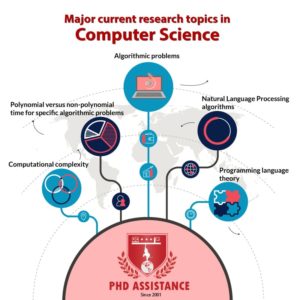
Computational complexity
The process of arranging computational process according to complexity based on algorithm has had various problems that are unsolved. This includes the Classic P versus the NP, the relationship between NQP and P, NP not known to be P or NP-complete, unique games conjecture, separations between other complexity cases, etc.
Polynomial versus non-polynomial time for specific algorithmic problems
A continuation in computational complexity is the complex case of NP- intermediate which contains within numerous unsolved problems related to algebra and number theory, Boolean logic, computational geometry, and computational topology, game theory, graph algorithm, etc.
Algorithmic problems
Scores of questions within the existing algorithm in computer science can be improved with new processes.
Natural Language Processing algorithms
Natural language processing is an important field within computer science with the onset of deep learning and Artificial and Intelligence. Plenty of researches are being carried in the field to find faster and perfect ways to syllabify, stem, and POS tag algorithms specifically for the English language.
Programming language theory
The case for scope of research about programming language within computer science is evergreen. There are always ways to design, implement, analyze, characterize, and classify programming languages and to develop newer languages.
- Check out our study guide to learn more about How to Select the Best Topics for Research?
Conclusion:
In conclusion, the journey of selecting the right PhD topic in computer science topics is a pivotal phase requiring careful deliberation. By combining passion, alignment with current computer science phd topics trends, and feasibility assessment, one can pave the way for a successful and rewarding research endeavor. Remember, the chosen topic will not only define your academic trajectory but also contribute to the evolving landscape of computer science thesis topics. Embrace the challenge with purpose, stay adaptable, and ensure that your research aligns with both personal interests and the broader needs of the field. With these considerations, you are poised to make a lasting impact in the world of Computer Science.
Example Research Topics in Technology and Computer Science
- Role of human-computer interaction
- AI and robotics
- Software engineering and programming
- Machine learning and neuron networks
About PhD Assistance
At PhD Assistance , we have a team of trained research specialists with topic selection experience. Our writers and researchers have extensive expertise in selecting the appropriate topic and title for a PhD dissertation based on their Specialized subject and personal interests. Furthermore, our professionals are drawn from worldwide and top-ranked colleges in nations such as the United States, United Kingdom, and India. Our writers have the expertise and understanding to choose a PhD research subject that is actually excellent for your study, as well as a snappy title that is unquestionably appropriate for your research aim.
In summary, it is important to keep in mind the following to choose an apt topic for your PhD research in Computer Science:
Your passion for an area of research
Appositeness of the topic
Feasibility of the research with respect to the availability of the resource
Providing a solution to a practical problem.
Topic selection help for computer science students
Computer Science Engineering Dissertation Topics
Hot Topics in Artificial Intelligence
Latest Research Topics 2023
- Computer science dissertation writing service
- Computer science PhD topics
- Computer science research topics
- Computer science thesis ideas
- computer science thesis topics
- computer science topics
- Computer science topics for research
- Latest research topics in computer science 2023
- Phd thesis writing service
- Phd topic selection help
- PhD topics in computer science
- Research paper topics for computer science

Quick Contact

- Adversial Attacks
- Artificial Intelligence
- Artificial Intelligence (AI) and ML ( Machine Learning )
- Big Data Analysis
- Business and Management
- Categories of Research methodology – PhDAssistance
- Category of Research Proposal Services
- coding & algorithm
- Computer Data Science
- Category of Machine Learning – PhDassistance
- Computer Science/Research writing/Manuscript
- Course Work Service
- Data Analytics
- Data Processing
- Deep Networks
- Dissertation Statistics
- economics dissertation
- Editing Services
- Electrical Engineering Category
- Engineering & Technology
- finance dissertation writing
- Gap Identification
- Healthcare Dissertation Writing
- Intrusion-detection-system
- journals publishing
- Life Science Dissertation writing services
- literature review service
- Machine Learning
- medical thesis writing
- Peer review
- PhD Computer Programming
- PhD Dissertation
- Phd Journal Manuscript
- Annotated Bibliography
- PhD Publication Support
- Phd thesis writing services
- Phd Topic Selection
- Categories of PhdAssistance Dissertation
- Power Safety
- problem identification
- Quantitative Analysis
- quantitative research
- Recent Trends
- Referencing and Formatting
- Research Gap
- research journals
- Research Methodology
- research paper
- Research Proposal Service
- secondary Data collection
- Statistical Consulting Services
- Uncategorized
PhD Assistance | Blog

- Values of Inclusion
- 2020 Antiracism Task Force
- 2022 DEI Report
- Research News
Department Life
- Listed by Recipient
- Listed by Category
- Oral History of Cornell CS
- CS 40th Anniversary Booklet
- ABC Book for Computer Science at Cornell by David Gries
- Books by Author
- Books Chronologically
- The 60's
- The 70's
- The 80's
- The 90's
- The 00's
- The 2010's
- Faculty Positions: Ithaca
- Faculty Positions: New York City
- Lecturer Position: Ithaca
- Post-doc Position: Ithaca
- Staff/Technical Positions
- Ugrad Course Staff
- Ithaca Info
- Internal info
- Graduation Information
- Cornell Tech Colloquium
- Student Colloquium
- Spring 2024 Colloquium
- Conway-Walker Lecture Series
- Salton 2023 Lecture Series
- Spring 2024 Artificial Intelligence Seminar
- Spring 2024 Robotics Seminar
- Spring 2024 Theory Seminar
- Big Red Hacks
- Cornell University - High School Programming Contests 2024
- Game Design Initiative
- CSMore: The Rising Sophomore Summer Program in Computer Science
- Explore CS Research
- ACSU Research Night
- Cornell Junior Theorists' Workshop 2023
- Researchers
- Ph.D. Students
- M.Eng. Students
- M.S. Students
- Ph.D. Alumni
- List of Courses
- Course and Room Roster
- CS Advanced Standing Exam
- Architecture
- Artificial Intelligence
- Computational Biology
- Database Systems
- Human Interaction
- Machine Learning
- Natural Language Processing
- Programming Languages
- Scientific Computing
- Software Engineering
- Systems and Networking
- Theory of Computing
- Contact Academic Advisor
- Your First CS Course
- Technical Electives
- CS with Other Majors/Areas
- Transfer Credits
- CS Honors Program
- CPT for International CS Undergrads
- Graduation Requirements
- Useful Forms
- Becoming a CS Major
- Requirements
- Game Design Minor
- Co-op Program
- Cornell Bowers CIS Undergraduate Research Experience (BURE)
- Independent Research (CS 4999)
- Student Groups
- UGrad Events
- Undergraduate Learning Center
- UGrad Course Staff Info
- The Review Process
- Early M.Eng Credit Approval
- Financial Aid
- Prerequisites
- The Application Process
- The Project
- Pre-approved Electives
- Degree Requirements
- The Course Enrollment Process
- Advising Tips
- Entrepreneurship
- Cornell Tech Programs
- Professional Development
- Contact MEng Office
- Career Success
- Applicant FAQ
- Computer Science Graduate Office Hours
- Exam Scheduling Guidelines
- Graduate TA Handbook
- MS Degree Checklist
- MS Student Financial Support
- Special Committee Selection
- Diversity and Inclusion
- Contact MS Office
- Ph.D. Applicant FAQ
- Graduate Housing
- Non-Degree Application Guidelines
- Ph. D. Visit Day
- Business Card Policy
- Cornell Tech
- Curricular Practical Training
- Fellowship Opportunities
- Field of Computer Science Ph.D. Student Handbook
- Field A Exam Summary Form
- Graduate School Forms
- Instructor / TA Application
- Ph.D. Requirements
- Ph.D. Student Financial Support
- Travel Funding Opportunities
- Travel Reimbursement Guide
- The Outside Minor Requirement
- CS Graduate Minor
- Outreach Opportunities
- Parental Accommodation Policy
- Special Masters
- Student Spotlights
- Contact PhD Office
Search form

Computer Science Ph.D. Program
You are here.
The Cornell Ph.D. program in computer science is consistently ranked among the top six departments in the country, with world-class research covering all of computer science. Our computer science program is distinguished by the excellence of the faculty, by a long tradition of pioneering research, and by the breadth of its Ph.D. program. Faculty and Ph.D. students are located both in Ithaca and in New York City at the Cornell Tech campus . The Field of Computer Science also includes faculty members from other departments (Electrical Engineering, Information Science, Applied Math, Mathematics, Operations Research and Industrial Engineering, Mechanical and Aerospace Engineering, Computational Biology, and Architecture) who can supervise a student's Ph.D. thesis research in computer science.
Over the past years we've increased our strength in areas such as artificial intelligence, computer graphics, systems, security, machine learning, and digital libraries, while maintaining our depth in traditional areas such as theory, programming languages and scientific computing. You can find out more about our research here .
The department provides an exceptionally open and friendly atmosphere that encourages the sharing of ideas across all areas.
Cornell is located in the heart of the Finger Lakes region. This beautiful area provides many opportunities for recreational activities such as sailing, windsurfing, canoeing, kayaking, both downhill and cross-country skiing, ice skating, rock climbing, hiking, camping, and brewery/cider/wine-tasting. In fact, Cornell offers courses in all of these activities.
The Cornell Tech campus in New York City is located on Roosevelt Island. Cornell Tech is a graduate school conceived and implemented expressly to integrate the study of technology with business, law, and design. There are now over a half-dozen masters programs on offer as well as doctoral studies.
FAQ with more information about the two campuses .
Ph.D. Program Structure
Each year, about 30-40 new Ph.D. students join the department. During the first two semesters, students become familiar with the faculty members and their areas of research by taking graduate courses, attending research seminars, and participating in research projects. By the end of the first year, each student selects a specific area and forms a committee based on the student's research interests. This “Special Committee” of three or more faculty members will guide the student through to a Ph.D. dissertation. Ph.D. students that decide to work with a faculty member based at Cornell Tech typically move to New York City after a year in Ithaca.
The Field believes that certain areas are so fundamental to Computer Science that all students should be competent in them. Ph.D. candidates are expected to demonstrate competency in four areas of computer science at the high undergraduate level: theory, programming languages, systems, and artificial intelligence.
Each student then focuses on a specific topic of research and begins a preliminary investigation of that topic. The initial results are presented during a comprehensive oral evaluation, which is administered by the members of the student's Special Committee. The objective of this examination, usually taken in the third year, is to evaluate a student's ability to undertake original research at the Ph.D. level.
The final oral examination, a public defense of the dissertation, is taken before the Special Committee.
To encourage students to explore areas other than Computer Science, the department requires that students complete an outside minor. Cornell offers almost 90 fields from which a minor can be chosen. Some students elect to minor in related fields such as Applied Mathematics, Information Science, Electrical Engineering, or Operations Research. Others use this opportunity to pursue interests as diverse as Music, Theater, Psychology, Women's Studies, Philosophy, and Finance.
The computer science Ph.D. program complies with the requirements of the Cornell Graduate School , which include requirements on residency, minimum grades, examinations, and dissertation.
The Department also administers a very small 2-year Master of Science program (with thesis). Students in this program serve as teaching assistants and receive full tuition plus a stipend for their services.
Enter a Search Term
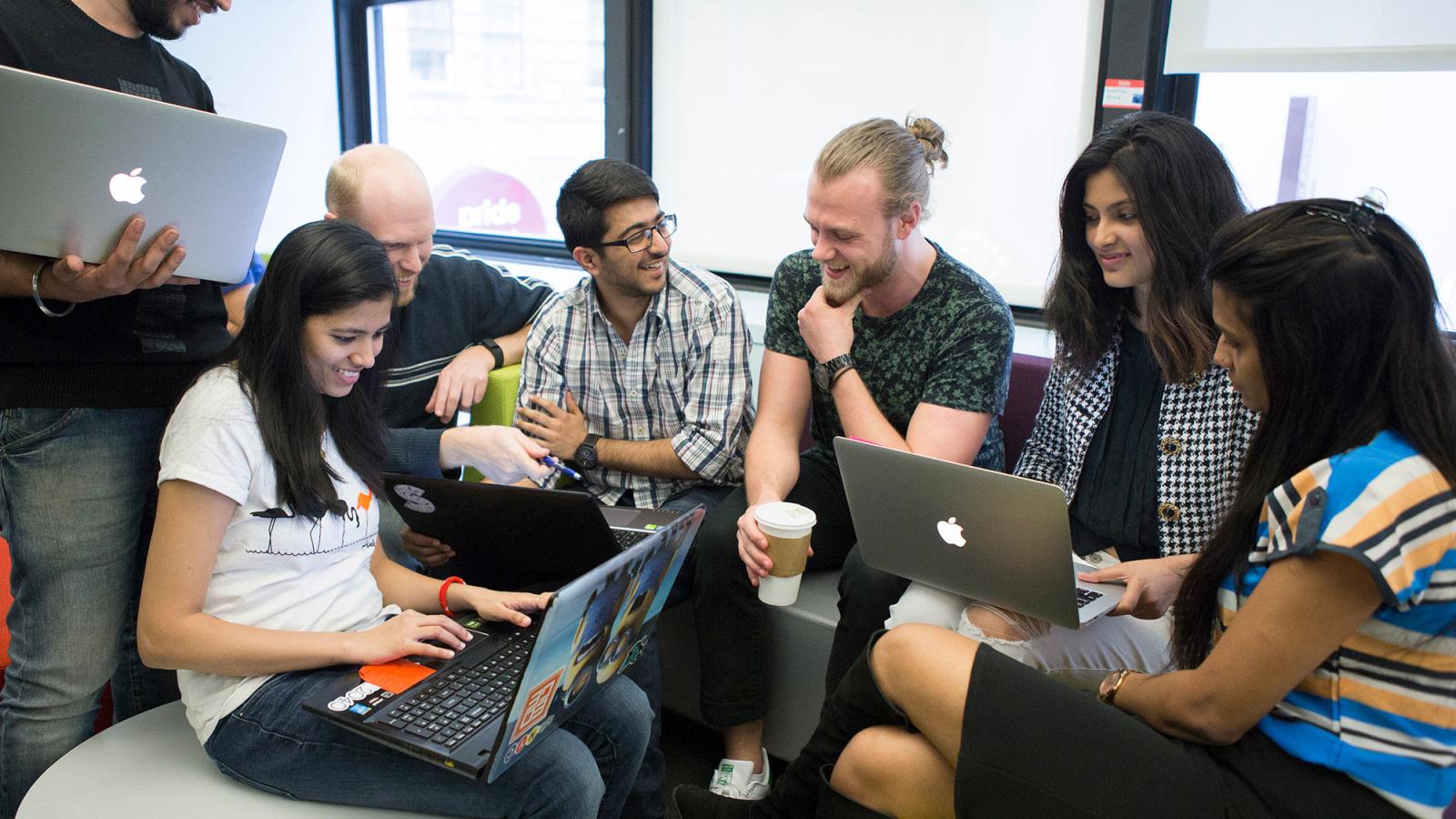
PhD in Computer Science
The PhD in Computer Science is a small and selective program at Pace University that aims to cultivate advanced computing research scholars and professionals who will excel in both industry and academia. By enrolling in this program, you will be on your way to joining a select group at the very nexus of technological thought and application.
Learn more about the PhD in Computer Science .
Forms and Research Areas
General forms.
- PhD Policies and Procedures Manual – The manual contains all the information you need before, during, and toward the end of your studies in the PhD program.
- Advisor Approval Form (PDF) – Completed by student and approved by faculty member agreeing to the role as advisor.
- Committee Member Approval Form (PDF) – Completed by student with signatures of each faculty member agreeing to be on dissertation committee.
- Change in Advisor or Committee Member Approval Form (PDF) – Completed by student with the approval of new advisor or committee member. Department Chair approval needed.
- Qualifying Exam Approval Form (PDF) – Complete and return form to the Program Coordinator no later than Week 6 of the semester.
Dissertation Proposal of Defense Forms
- Application for the Dissertation Proposal of Defense Form (PDF) – Completed by student with the approval of committee members that dissertation proposal is sufficient to defend. Completed form and abstract and submitted to program coordinator for scheduling of defense.
- Dissertation Proposal Defense Evaluation Form (PDF) – To be completed by committee members after student has defended his dissertation proposal.
Final Dissertation Defense Forms
- Dissertation Pre- Defense Approval Form (PDF) – Committee approval certifying that the dissertation is sufficiently developed for a defense.
- Dissertation Defense Evaluation Form (PDF) – Completed by committee members after student has defended his dissertation.
All completed forms submitted to the program coordinator.
Research Areas
The Seidenberg School’s PhD in Computer Science covers a wealth of research areas. We pride ourselves on engaging with every opportunity the computer science field presents. Check out some of our specialties below for examples of just some of the topics we cover at Seidenberg. If you have a particular field of study you are interested in that is not listed below, just get in touch with us and we can discuss opportunities and prospects.
Some of the research areas you can explore at Seidenberg include:
Algorithms And Distributed Computing
Algorithms research in Distributed Computing contributes to a myriad of applications, such as Cloud Computing, Grid Computing, Distributed Databases, Cellular Networks, Wireless Networks, Wearable Monitoring Systems, and many others. Being traditionally a topic of theoretical interest, with the advent of new technologies and the accumulation of massive volumes of data to analyze, theoretical and experimental research on efficient algorithms has become of paramount importance. Accordingly, many forefront technology companies base 80-90% of their software-developer hiring processes on foundational algorithms questions. The Seidenberg faculty has internationally recognized strength in algorithms research for Ad-hoc Wireless Networks embedded in IoT Systems, Mobile Networks, Sensor Networks, Crowd Computing, Cloud Computing, and other related areas. Collaborations on these topics include prestigious research institutions world-wide.
Machine Learning In Medical Image Analysis
Machine learning in medical imaging is a potentially disruptive technology. Deep learning, especially convolutional neural networks (CNN), have been successfully applied in many aspects of medical image analysis, including disease severity classification, region of interest detection, segmentation, registration, disease progression prediction, and other tasks. The Seidenberg School maintains a research track on applying cutting-edge machine learning methods to assist medical image analysis and clinical data fusion. The purpose is to develop computer-aided and decision-supporting systems for medical research and applications.
Pattern recognition, artificial intelligence, data mining, intelligent agents, computer vision, and data mining are topics that are all incorporated into the field of robotics. The Seidenberg School has a robust robotics program that combines these topics in a meaningful program which provides students with a solid foundation in the robotics sphere and allows for specialization into deeper research areas.
Cybersecurity
The Seidenberg School has an excellent track record when it comes to cybersecurity research. We lead the nation in web security, developing secure web applications, and research into cloud security and trust. Since 2004, Seidenberg has been designated a Center of Academic Excellence in Information Assurance Education three times by the National Security Agency and the Department of Homeland Security and is now a Center of Academic Excellence in Cyber Defense Education. We also secured more than $2,000,000 in federal and private funding for cybersecurity research during the past few years.
Pattern Recognition And Machine Learning
Just as humans take actions based on their sensory input, pattern recognition and machine learning systems operate on raw data and take actions based on the categories of the patterns. These systems can be developed from labeled training data (supervised learning) or from unlabeled training data (unsupervised learning). Pattern recognition and machine learning technology is used in diverse application areas such as optical character recognition, speech recognition, and biometrics. The Seidenberg faculty has recognized strengths in many areas of pattern recognition and machine learning, particularly handwriting recognition and pen computing, speech and medical applications, and applications that combine human and machine capabilities.
A popular application of pattern recognition and machine learning in recent years has been in the area of biometrics. Biometrics is the science and technology of measuring and statistically analyzing human physiological and behavioral characteristics. The physiological characteristics include face recognition, DNA, fingerprint, and iris recognition, while the behavioral characteristics include typing dynamics, gait, and voice. The Seidenberg faculty has nationally recognized strength in biometrics, particularly behavioral biometrics dealing with humans interacting with computers and smartphones.
Big Data Analytics
The term “Big Data” is used for data so large and complex that it becomes difficult to process using traditional structured data processing technology. Big data analytics is the science that enables organizations to analyze a mixture of structured, semi-structured, and unstructured data in search of valuable information and insights. The data come from many areas, including meteorology, genomics, environmental research, and the internet. This science uses many machine learning algorithms and the challenges include data capture, search, storage, analysis, and visualization.
Business Process Modeling
Business Process Modeling is the emerging technology for automating the execution and integration of business processes. The BPMN-based business process modeling enables precise modeling and optimization of business processes, and BPEL-based automatic business execution enables effective computing service and business integration and effective auditing. Seidenberg was among the first in the nation to introduce BPM into curricula and research.
Educational Approaches Using Emerging Computing Technologies
The traditional classroom setting doesn’t suit everyone, which is why many teachers and students are choosing to use the web to teach, study, and learn. Pace University offers online bachelor's degrees through NACTEL and Pace Online, and many classes at the Seidenberg School and Pace University as a whole are available to students online.
The Seidenberg School’s research into new educational approaches include innovative spiral education models, portable Seidenberg labs based on cloud computing and computing virtualization with which students can work in personal enterprise IT environment anytime anywhere, and creating new semantic tools for personalized cyber-learning.

- 2022 Update
- 2021 Update
- 2020 Update
- Reputation and History
- Departments and Programs
- Faculty Recruiting
- Zoom Backgrounds
- Board of Visitors
- SCI Learning Academy
- Administration
- Faculty Directory
- Staff Directory
- PhD Students
- Diversity, Equity and Inclusion at SCI
- Diversity, Equity and Inclusion Committee
- School Initiatives and Resources
- University Initiatives and Resources
- Carving the path to safer and smarter buildings
- A holistic approach to intelligent social learning
- How to anticipate hiccups in health care
- Preserving a shared digital memory
- Holding information technologies accountable and addressing misinformation on the web
- More than an afterthought: Dr. Ibrahim shows students the necessity of cybersecurity
- Current Grants
- Faculty Accepting Undergraduate Students for Research
- Submit Research for Undergraduate Students
- Labs, Centers, and Institutes
- Visiting Scholars
- Undergraduate Research Scholars
- Degrees and Programs
- Find the Right Major for You
- Computational Biology
- Computational Social Science
- Computer Science
- Data Science
- Digital Narrative and Interactive Design
- Information Science
- BS + MS in Computer Science
- Physics and Quantum Computing
- Library and Information Science
- Intelligent Systems
- Telecommunications
- Computational Modeling and Simulation
- Information Science with a focus in Telecommunications
- Applied Data Driven Methods
- Big Data Analytics
- Cybersecurity, Policy, and Law
- Information and Network Security
- Professional Institute
- Types of Opportunities
- Experiential Learning Courses
- Meet Alexa Spaventa
- Meet J. Stephanie Rose
- Meet Lydon Pelletier
- Meet Pedro Bustamante
- Meet Nico Campuzano
- Meet Andrea Michael
- Meet Kinori Rosnow
- Take the Next Step
- Undergraduate Admissions FAQ
- Master's Admissions
- Doctoral Admissions
- Certificate Admissions
- GRE Requirements
- Financial Aid
- Scholarships
- Campus Life
- Information Sessions
- A-Z Student Resources
- Responsibilities
- Placement Assessments
- General Education Requirements
- Major and Minor Declaration
- Faculty Mentors
- Contact the SCI Advising Center
- Building Hours
- Career Resources
- Post-Graduate Outcomes
- Enrollment Resources
- Graduation Process and Expectations
- Apply for Graduation
- School Recognition Ceremony
- Information Technology
- Graduate Student Orientation
- New Graduate Student FAQ
- Undergraduate Student Orientation
- Ombudsperson
- Academic Integrity Policy
- Experiential Learning Policies
- School Forms
- Student Appeals
- Student Organizations
- Academic Support and Tutoring
- Student Success Workshops
- Who to Contact
- Submit a News Item
- Event Assistance & Promotion
- Doctoral Degrees
Computer Science, PhD
Researchers from all fields use computational models to analyze massive amounts of data. There’s a growing need for computer scientists who can collaborate with other domains and also research ways to improve the networks, the operating systems, and the multitude of devices that are integrated into our daily lives.
Our PhD in Computer Science program prepares you for a career in research and/or teaching by providing the necessary course work and collaborative environment for both supervised and independent research. Our PhD students are researching mobile apps to help improve the science of learning, building operating systems for high-performance computers, addressing security and privacy from a data-oriented perspective, improving computer performance, and more.
You’ll have the opportunity to take part in the diverse faculty research collaborations with other departments and programs within the university, such as the Learning Research and Development Center, the School of Engineering, and the School of Medicine.
Degree Requirements
Course requirements.
The PhD degree requires 72 credits of formal course work, independent study, directed study, and/or dissertation research. In addition to the credit requirement, twelve courses are required for the PhD categorized as follows: four foundation courses, six elective courses, CS 2001 (Research Topics in Computer Science) and CS 2002 (Research Experiences in Computer Science). CS 2001 must be taken during the first fall term and CS 2002 must be taken during the following spring term.
The four foundation courses must cover each of the following four foundation areas.
Architecture and Compilers
- CS 2410 - Computer Architecture OR
- CS 2210 - Compiler Design
Operating Systems and Networks
- CS 2510 - Computer Operating Systems OR
- CS 2520 - Wide Area Networks
Artifical Intelligence and Database Systems
- CS 2710 - Foundations of Artificial Intelligence OR
- CS 2550 - Principles of Database Systems
Theory and Algorithms
- CS 2110 - Introduction to Theory of Computation OR
- CS 2150 - Design and Analysis of Algorithms
The six elective courses must be 2100-level or higher CSD courses and cannot be independent study courses ( CS 2990 , CS 3000 ), graduate internship ( CS 2900 ), thesis project or research courses ( CS 2910 , CS 3900 ). At least two of the six courses must be at the 3000-level.
The following requirements apply to the 12 required courses:
- All must be taken for a letter grade.
- Students are required to complete the four required foundation area courses by the end of the fourth regular term of study. Regular terms include the fall and spring and do not include the summer session.
- The student must receive a grade of B or better in each of the required foundation area courses, and a grade of B-or better in each of the six additional courses; in addition, he or she must maintain an overall average QPA of 3.0 or better.
- No more than 6 of the 12 courses may be taken outside of the CSD. This includes up to four courses that are transfered from other universities at the time of admission. All courses from outside the CSD must be approved by GPEC.
- All 12 courses must be successfully completed before admission to candidacy for the PhD (This normally occurs when the student passes the oral examination during the dissertation proposal.)
For full degree requirements details, visit the Computer Science course catalog .
Admissions Requirements
Graduate Program
In the Computer Science program, you will learn both the fundamentals of computation and computation’s interaction with the world. Your work will involve a wide range of areas including theoretical computer science, artificial intelligence and machine learning, economics and computer science, privacy and security, data-management systems, intelligent interfaces, operating systems, computer graphics, computational linguistics, robotics, networks, architectures, program languages, and visualization.
You will be involved with researchers in several interdisciplinary initiatives across the University, such as the Center for Research on Computation and Society , the Data Science Initiative , and the Berkman Klein Center for Internet and Society .
Examples of projects current and past students have worked on include leveraging machine learning to solve real-world sequential decision-making problems and using artificial intelligence to help conservation and anti-poaching efforts around the world.
APPLY NOW >
Computer Science Degree
Harvard School of Engineering offers a Doctor of Philosophy (Ph.D) degree in Computer Science , conferred through the Harvard Kenneth C. Griffin Graduate School of Arts and Sciences. Prospective students apply through Harvard Griffin GSAS; in the online application, select “Engineering and Applied Sciences” as your program choice and select "PhD Computer Science" in the Area of Study menu.
In addition to the Ph.D. in Computer Science, the Harvard School of Engineering also offers master’s degrees in Computational Science and Engineering as well as in Data Science which may be of interest to applicants who wish to apply directly to a master’s program.
Computer Science Career Paths
Graduates of the program have gone on to a range of careers in industry in companies like Riot Games as game director and Lead Scientist at Raytheon. Others have positions in academia at University of Pittsburgh, Columbia, and Stony Brook.
Admissions & Academic Requirements
Prospective students apply through the Harvard Kenneth C. Griffin Graduate School of Arts and Sciences (Harvard Griffin GSAS). In the online application, select “Engineering and Applied Sciences” as your program choice and select "PhD Engineering Sciences: Electrical Engineering." Please review the admissions requirements and other information before applying. Our website also provides admissions guidance , program-specific requirements , and a PhD program academic timeline . In the application for admission, select “Engineering and Applied Sciences” as your degree program choice and your degree and area of interest from the “Area of Study“ drop-down. PhD applicants must complete the Supplemental SEAS Application Form as part of the online application process.
Academic Background
Applicants typically have bachelor’s degrees in the natural sciences, mathematics, computer science, or engineering.
Standardized Tests
GRE General: Not Accepted
Computer Science Faculty & Research Areas
View a list of our computer science faculty and computer science affiliated research areas . Please note that faculty members listed as “Affiliates" or "Lecturers" cannot serve as the primary research advisor.
Computer Science Centers & Initiatives
View a list of the research centers & initiatives at SEAS and the computer science faculty engagement with these entities .
Graduate Student Clubs
Graduate student clubs and organizations bring students together to share topics of mutual interest. These clubs often serve as an important adjunct to course work by sponsoring social events and lectures. Graduate student clubs are supported by the Harvard Kenneth C. Griffin School of Arts and Sciences. Explore the list of active clubs and organizations .
Funding and Scholarship
Learn more about financial support for PhD students.
- How to Apply
Learn more about how to apply or review frequently asked questions for prospective graduate students.
In Computer Science
- First-Year Exploration
- Concentration Information
- Secondary Field
- Senior Thesis
- AB/SM Information
- Student Organizations
- PhD Timeline
- PhD Course Requirements
- Qualifying Exam
- Committee Meetings (Review Days)
- Committee on Higher Degrees
- Research Interest Comparison
- Collaborations
- Cross-Harvard Engagement
- Lecture Series
- Clubs & Organizations
- Centers & Initiatives
- Alumni Stories
Email forwarding for @cs.stanford.edu is changing. Updates and details here . CS Commencement Ceremony June 16, 2024. Learn More .
PhD Admissions
Main navigation.
The Computer Science Department PhD program is a top-ranked research-oriented program, typically completed in 5-6 years. There are very few course requirements and the emphasis is on preparation for a career in Computer Science research.
Eligibility
To be eligible for admission in a Stanford graduate program, applicants must meet:
- Applicants from institutions outside of the United States must hold the equivalent of a United States Bachelor's degree from a college or University of recognized good standing. See detailed information by region on Stanford Graduate Admissions website.
- Area of undergraduate study . While we do not require a specific undergraduate coursework, it is important that applicants have strong quantitative and analytical skills; a Bachelor's degree in Computer Science is not required.
Any questions about the admissions eligibility should be directed to [email protected] .
Application Checklist
An completed online application must be submitted by the CS Department application deadline and can be found here .
Application Deadlines
The online application can be found here and we will only one admissions cycle for the PhD program per respective academic term.

- Majors & Careers
- Online Grad School
- Preparing For Grad School
- Student Life
Top 10 Best PhD in Computer Science Programs

Are you looking to further your studies in computer science? Perfect! I’ve researched and put together these ten computer science PhD programs, so keep reading to find your next course!
As you know, PhD in computer science holders are sought-after specialists, with current demand far outstripping supply. According to the Bureau for Labor Statistics , jobs for computer and information research scientists are estimated to grow by an impressive 22% between 2020 and 2030. You might score similar positions with a PhD in mathematics , too. But a PhD in computer science can open doors to some of the most lucrative jobs in the industry.
Let’s explore some of the best computer science PhD courses in the US!
Table of Contents
Best Computer Science PhD Programs and Universities
Stanford university.
PhD in Computer Science

Stanford University is one of the most famous research institutions in the world, and its Computer Science programs have been ranked second in the USA. This PhD program involves a research rotation scheme where students participate in different research groups during the first year. This exposes them to different subjects and lets them know the faculty and fellow students.
- Courses : Analysis of algorithms, programming languages, and computer network & security.
- Credits : 135 course units
- Duration : 5-6 years
- Delivery : On-campus
- Tuition : Refer tuition page (full funding available)
- Financial aid : Research assistantships, teaching assistantships, fellowships, and grants
- Acceptance rate: 5.2%
- Location : Stanford, California
Massachusetts Institute of Technology
PhD in Computer Science and Engineering
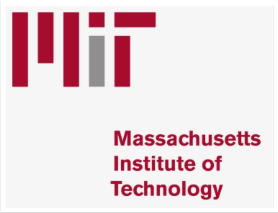
MIT is known as the best technical institution in the world, and its computer science programs were ranked first in the country by the US & News report. Students can work with all schools and departments throughout their studies.
- Courses : Software & computation for simulation, process data analytics & machine learning, and numerical computing & interactive software.
- Credits : 60
- Tuition : Refer tuition page
- Financial aid: Scholarships, federal work-study, fellowships, assistantships, grants, and veteran benefits
- Acceptance rate: 7.3%
- Location : Cambridge, Massachusetts
Carnegie Mellon University, School of Computer Sciences
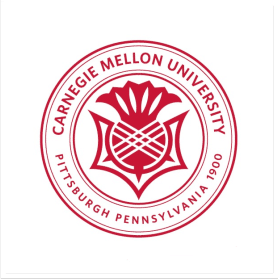
CMU is a globally acclaimed private research university, home to conducting cutting-edge technology research across its seven prestigious schools. This is one of the few PhD programs in computer science with an optional dual degree arrangement enabling you to study programs with one of seven Portuguese universities.
- Courses : Algorithms & complexity, artificial intelligence, and software systems.
- Credits : 96 university units
- Tuition : $48,250 per year
- Financial aid: Full funding, fellowships, and scholarships
- Acceptance rate : 17.3%
- Location : Pittsburgh, Pennsylvania
Harvard University, Harvard John A. Paulson School of Engineering and Applied Sciences
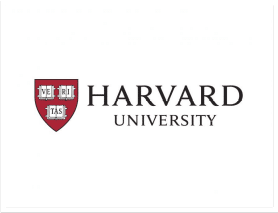
Harvard University is a world-renowned research institution that aims to achieve the perfect mix of scholarship and innovation. Across the university, every PhD student is given a field advisor right from the beginning of the program. Then, the student identifies a research area and a potential research advisor in their first two semesters. Upon qualifying, the research advisor nominates a research committee to assist the student throughout their graduate career.
- Courses : Algorithms & their limitations, data structures & algorithms, and cryptography.
- Credits : 16 half-courses
- Duration : 2 years minimum
- Financial aid : Full funding, fellowships, teaching assistantships, and research assistantships
- Acceptance rate: 5%
Duke University, The Graduate School

Duke University is an internationally acclaimed private research university known for its inclusivity. Its Center for Exemplary Mentoring aims to increase the number of PhD graduates from underrepresented and minority communities. Its PhD of Computer Science program is flexible and allows students to choose between a coursework-only option of 30 credits or a thesis.
- Courses : Programming & problem solving, computational microeconomics, and software design & implementation.
- Credits : 8 courses
- Duration : 5 years
- Tuition : $4,325 per semester
- Financial aid : Grants, fellowships, teaching assistantships, and research assistantships
- Acceptance rate : 7.7%
- Location : Durham, North Carolina
The University of California Berkeley, Department of Electrical Engineering and Computer Sciences (EECS)

The University of California Berkeley is a prestigious university committed to student diversity and has a dedicated Office for Graduate Diversity to support students from all backgrounds. This PhD program offers research opportunities in biosystems and computational biology, cyber-physical systems and design automation (CPSDA), and computer architecture and engineering.
- Courses : Combinatorial algorithms & data structures, design of programming languages, and implementation of database systems.
- Credits : 24 units minimum
- Duration : 5.5 – 6 years
- Tuition : $6,132 per semester
- Financial aid : Fellowships, scholarships, grants, research stipends, loans, and work-study
- Acceptance rate : 17%
- Location : Berkeley, California
California Institute of Technology, Computing & Mathematical Sciences Department
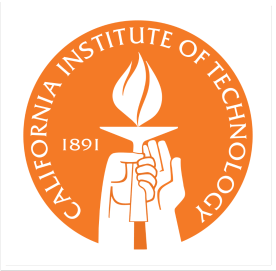
The California Institute of Technology, also known as Caltech, is one of the most renowned technology institutions in the world despite its comparatively small size. This PhD program allows students to develop an in-depth understanding of and conduct research in areas related to mathematical and algorithmic foundations of computer science.
- Courses : Quantum cryptography, information theory, and network control systems.
- Credits : 135 units
- Duration : 6 years
- Tuition : $63,063 per year
- Financial aid : Fellowships, assistantships, loans, stipends, scholarships, and work-study
- Acceptance rate : 6.7%
- Location : Pasadena, California
Cornell University, Bowers College of Computing and Information Science

Cornell University is home to several famous technology schools, such as Cornell Tech, which conducts cutting-edge research to find solutions to the challenges of our modern, digital world. In this PhD program, students choose a minor from one of the 90 available fields outside of computer science to widen their knowledge base.
- Courses : Parallel computing, programming environments, and natural language processing.
- Duration : 12 semesters
- Tuition : $24,800 per year
- Financial aid: Assistantships, fellowships, loans, and stipends
- Acceptance rate : 10.7%
- Location : Ithaca, New York
The University of Illinois Urbana-Champaign, The Grainger College of Engineering

The Grainger College of Engineering focuses on research to improve quality of life through innovation, entrepreneurship, and societal engagement. In this flexible PhD program, students are assigned three committee members during the first semester. The student can then consult with these mentors to plan their studies to meet their career goals.
- Courses : Programming language semantics, machine learning for signals, and learning-based robotics.
- Credits : 96, or 64 if you already have an MS
- Duration : 5-7 years
- Financial aid : Grants, fellowships, waivers, loans, and employment
- Acceptance rate : 63.3%
- Location : Urbana, Illinois
Princeton University, The Graduate School

Princeton University is one of the top universities in the country in computer science doctorate programs. This PhD program involves studying six courses, including one each from the three main areas of Artificial Intelligence, Systems, and Theory, which form the program’s core.
- Courses : Programming languages, advanced computer systems, and information theory & applications.
- Credits : 6 courses
- Tuition : $62,860 per year
- Financial aid : Teaching assistantships, research assistantships, and fellowships
- Acceptance rate : 5.6%
- Location : Princeton, New Jersey
What Do I Need to Get a PhD in Computer Science?
For most programs, you’ll need a bachelor’s or master’s degree in computer science or a related field; however, exact eligibility requirements vary depending on the school. To earn your PhD, you’ll typically need to complete coursework, qualifying exams, and a dissertation.
What to Consider When Choosing a Computer Science PhD Program
Several US schools and universities offer PhD in computer science programs — choosing the right program for you can feel overwhelming. So, take your time and research the curriculum and specialties for different programs to make sure they match your areas of interest.
If you’re unsure about the areas you want to specialize in, I advise you to read research papers across different fields and discuss career opportunities with people in the industry. It’s also a good idea to look up the faculty from the programs you’re interested in and review their recent papers.
Here are some key factors to keep in mind when choosing a computer science PhD:
- Curriculum and specialties offered
- The program’s reputation
- Faculty, their specialties, and reputation
- Cost of tuition and other fees
- Delivery mode: on-campus, online, or hybrid
- Funding options
Related Reading: Top 10 Best Online PhDs in Computer Science
Why Get a Doctor of Computer Science Degree?
A doctorate in computer science will equip you to become a leading researcher in today’s digital technologies. You’ll also be eligible for senior academic positions with a PhD in the field.
Furthermore, a PhD in computer science allows you to work in various respectable roles. Here are some of the top jobs and average yearly salaries for computer science PhD holders:
- Data Scientist – $99,710
- Chief Data Scientist – $211,702
- Software Architect – $136,541
- Software Development Manager – $133,534
- Senior Researcher – $107,657
Approximately 2,000 students earn a computer science PhD from US universities each year. The industry demand is much greater than the supply. Furthermore, many PhD candidates are international students who return home after graduation. Therefore, graduates with a PhD in computer science are in high demand in the US.
PhD in Computer Science: Key Facts
How much does a phd in computer science cost.
Tuition varies depending on the program but generally falls between $15,000 and $60,000 per year. Besides the tuition fees, you will also need to factor in additional costs like academic fees, books, other educational resources, and living expenses.
How Long Does It Take to Get a PhD in Computer Science?
A PhD in computer science usually takes 3-7 years to complete.
What Skills Do You Gain from Doing a PhD in Computer Science?
A PhD in computer science allows students to develop leadership, problem-solving, and research skills related to complex topics like artificial intelligence, machine learning, and robotics.
Key Takeaways
A PhD in computer science is one of the most in-demand qualifications in today’s hyper-digital world. It can equip you with specialized skills and knowledge to address modern tech problems with innovative solutions.
If you found this article helpful, take a look at our other guides, including the best Master’s in Computer Science programs , the top online PhD programs , and the highest paying PhDs .
Frequently Asked Questions
What is a phd in computer science like.
A PhD in computer science typically involves research, coursework, thesis preparation, teaching, and seminars related to computer science subjects. Individual programs may have other requirements.
Can You Get a PhD in Computer Science?
Yes, many universities offer computer science PhD programs . You’ll usually need a bachelor’s or a master’s degree in computer science or a related field to apply.
Is a PhD in Computer Science Worth It?
While a PhD in computer science requires considerable financial investment, it is a valuable qualification in today’s tech-forward world. Plenty of job opportunities and high remuneration levels await a computer science PhD graduate, with the average annual salary of $133,000 per year.
What Does a PhD in Computer Science Do?
A qualified PhD computer science graduate may conduct research in complex computer systems, design and develop programs and applications, or study human-computer interaction to find innovative solutions for society. They may also work in academics, either in teaching, research, or both.
What Can I Do with a PhD in Computer Science?
With a PhD in Computer Science on your resume, you’ll be hired for roles like data scientist, software architect, researcher, or academic professor and build a prestigious, high-paid career.
Which Subject is Best for a PhD in Computer Science?
A wide range of subjects will qualify you to apply for a doctoral degree in computer science. Popular topics include data structures and algorithms, computer systems and organization, and discrete computer science mathematics. The best subject for you depends on your interests and career ambitions.

Lisa Marlin
Lisa is a full-time writer specializing in career advice, further education, and personal development. She works from all over the world, and when not writing you'll find her hiking, practicing yoga, or enjoying a glass of Malbec.
- Lisa Marlin https://blog.thegradcafe.com/author/lisa-marlin/ 12 Best Laptops for Computer Science Students
- Lisa Marlin https://blog.thegradcafe.com/author/lisa-marlin/ ACBSP Vs AACSB: Which Business Program Accreditations is Better?
- Lisa Marlin https://blog.thegradcafe.com/author/lisa-marlin/ BA vs BS: What You Need to Know [2024 Guide]
- Lisa Marlin https://blog.thegradcafe.com/author/lisa-marlin/ The 19 Best MBA Scholarships to Apply for [2024-2025]
How To Prep Your Resume For Success (When You’ve No Work Experience)
Best neuroscience phd programs: careers, and more [2024], related posts.

- Applying to Big Tech This Year? Here’s How to Ace It.

- 73% of job seekers believe a degree is needed for a well-paying role–but is it?

Tech Talent Crunch: Cities with More Jobs Than Workers

The Most Under-Rated Career Advancement Tip for 2024

Top 5 Best Psychology PhD Programs in 2024

Good News For Early Careers: Skills-Based Hiring is Surging

Leave a Reply Cancel reply
Your email address will not be published. Required fields are marked *
Save my name, email, and website in this browser for the next time I comment.
Recent Posts
- 12 Best Laptops for Computer Science Students
- Is a Master’s Degree Worth It? [2024 Guide]
- Graduate Certificate vs Degree: What’s the Difference? [2024 Guide]

© 2024 TheGradCafe.com All rights reserved
- Partner With Us
- Results Search
- Submit Your Results
- Write For Us
- Menu Close
- Search
PhD Program Admissions
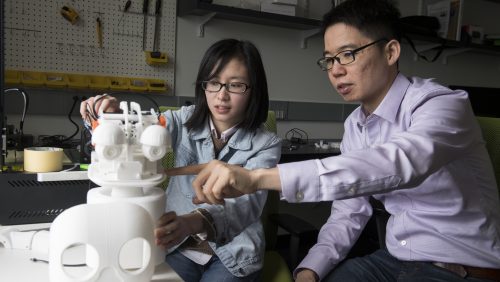
Applying to our PhD Program
We’re thrilled that you are interested in our PhD program in computer science! This page provides an overview of the application process, some guidelines, and answers to specific questions. Please check our FAQ before emailing [email protected] with any questions not answered here.
Our program accepts a large number of applicants each year from a diverse range of backgrounds. Our applicants come directly from undergraduate or master’s programs, as well as industry positions, and from within United States and numerous countries around the world.
Visit the interactive PhD program statistics page to view historical program data pertaining to admissions, enrollment, retention/attrition/completion, and time to degree conferral. (Select “ Computer Science” from the “Choose Program” drop-down menu.)
Ready to start your PhD application?
We’re ready for you. Click on the link below to start your application to become a PhD student at Johns Hopkins University
The Application: General Advice
The most important question we ask when reviewing applications is "Will this individual excel at research?" Every part of your application is helpful insofar as it answers this question. The three major components of an application are the statement, letters of recommendation, and grades.
This is one of the most important parts of your application; it lets us get to know you and creates a narrative of your academic career and future plans. Before you write your statement, start by thinking about what you want us to learn about you. Make a list of important achievements, perspectives, and goals. Build your statement around this list. We are looking for students who have made the most of the opportunities they have been presented with and who are smart, creative, and motivated. Keep in mind that we also have your CV and letters of recommendation, so we don’t necessarily need a list of all your accomplishments. However, your statement can fill in the narrative around what you did and, more specifically, why you did it. What motivates you? What are your research interests and why? These details aren’t found elsewhere in your application, so focus on them in your statement.
There are a few things we suggest not including in your statement. While it’s tempting to give a rationale for why you are applying to our program, don’t include it if it’s uninformed. Consider: “I want to apply to Johns Hopkins because it’s one of the premiere academic programs.” We know that already! If you do have specific reasons to be interested in our program (e.g. location, a specific project, a faculty member, etc.), be sure to mention them.
In terms of your motivation, be specific! Don’t write: “I’ve wanted to do a PhD in CS since I was six years old.” We don’t trust that six-year-olds make good career decisions. If you write “I have always found AREA X fascinating,” explain why.
Letters of Recommendation
The two most important factors of a recommendation letter are: 1) select someone who knows you well, and 2) select someone who knows how to write a letter.
First, it’s tempting to ask Professor X. to write a letter for you because they are a well-known person in the field. While we can better contextualize letters from people we know, it’s only helpful if the letter contains meaningful information. If Professor X. writes, “I’ve met the applicant a few times and they seem sharp,” that’s not useful information. It’s more important to select someone who knows you well and can discuss your achievements in detail.
Second, your letter writer should know how to write a letter. Academic research programs look for different things than a company. We often read letters from work supervisors that say nice things, but don’t speak to the qualities we find most important.
Of course, it’s a balance. You want someone who knows you well, but they still need to know how to write a good letter of recommendation.
We understand that three letters are a lot, especially for an undergraduate applying directly to a PhD program. We don’t expect each candidate to have three amazing letters. Your choices should be about balance: you want people who know you well, can write good academic letters, and know the research field. Use your choice of your three letter-writers to create this balance.
There isn’t much you can do about your grades—you have the grades you have. However, we do not use any grade cutoffs or thresholds in admissions. We want to see that you did well and excelled in whatever program you were in. Did you push yourself to take upper-level classes? Did you do well in the classes most directly related to your research area? If you have special circumstances that explain some of your grades, please include a description of them in your statement.
The Whiting School of Engineering does not require GRE General Test scores for applications to our PhD programs.
TOEFL or IELTS
Non-native English speakers must take the TOEFL or IELTS exams. Details on accepted exams, scores, and exceptions to this requirement can be found here .
Application Tips
There are many helpful guides for PhD applications. Here are a few we recommend:
- How to be a Successful PhD Student (co-authored by our own Mark Dredze )
- What Readers Look for in a Statement of Purpose
- Student Perspectives on Applying to NLP PhD Programs
- A Survival Guide to a PhD
Application Deadlines
Application Deadline:
The deadline for fall is December 15th. (No recruiting for spring admissions.)
The application will be available for submission on or around August 15.

Vivien Thomas Scholars
The Vivien Thomas Scholars Initiative (VTSI) is an endowed fellowship program at Johns Hopkins for PhD students in STEM fields. It provides full tuition, stipend, and benefits while also providing targeted mentoring, networking, community, and professional development opportunities. Students who have attended a historically black college and university or other minority serving institution for undergraduate study are eligible to apply. To be considered for the VTSI, all application and supplementary materials must be received by December 1, 2021.
We offer a range of services to help you
- 0091.11.4951 3011
Home / Blog
PhD Topics in Computer Science for Real-World Applications
Welcome to the fascinating world of PhD topics in computer science , where innovation, intellect, and real-world applications converge to pave the way for groundbreaking research. In this world of limitless possibilities, computer science PhD topics offer an unparalleled opportunity for aspiring researchers to delve into cutting-edge domains, unleashing their creativity to address the pressing challenges of our time. Embark on a journey of intellectual exploration as we uncover the most captivating and relevant computer science topics for PhD research, guiding you towards shaping the future through your passion for technology and its transformative potential.
Some Specific Examples of Computer Science Topics For PhD Research That Have Real-World Applications
1 . AI-Powered Healthcare Diagnostics:
Computer science plays a critical role in advancing healthcare diagnostics through artificial intelligence (AI). By leveraging machine learning and deep learning algorithms, researchers can develop systems capable of accurately diagnosing medical conditions from various sources such as medical imaging, patient records, and genetic data. A potential PhD topic in this field could focus on:
- Deep Learning for Medical Image Analysis: Develop advanced convolutional neural networks (CNNs) or other deep learning models to automatically analyze medical images like X-rays, MRIs, or CT scans. The aim is to detect and classify abnormalities, enabling early detection and precise diagnosis.
- Predictive Analytics for Personalized Medicine: Utilize AI techniques to analyze patient data and identify patterns that can lead to personalized treatment plans. By integrating genetic information, medical history, and lifestyle data, the research can help tailor treatments to individual patients, optimizing outcomes.
2. Sustainable Smart Cities:
Computer science offers innovative solutions for creating energy-efficient and sustainable smart cities, integrating information technology with urban infrastructure. A PhD research topic in this domain could explore:
- IoT-Based Resource Management: Design and implement Internet of Things (IoT) solutions to monitor and manage resource consumption in cities, such as energy, water, and waste. Develop algorithms that optimize resource allocation and reduce environmental impact.
- Smart Transportation Systems: Propose intelligent transportation systems that use real-time data, including traffic patterns, public transport usage, and weather conditions, to optimize commuting and reduce congestion, thereby lowering carbon emissions.
3. Cybersecurity for Critical Infrastructures :
With the growing dependence on digital systems, securing critical infrastructures is of paramount importance. A PhD research topic in this field can focus on:
- Threat Detection and Response: Develop AI-driven cybersecurity solutions that use machine learning algorithms to detect and respond to cyber threats in real-time, enhancing the resilience of critical infrastructure systems.
- Blockchain-Based Security for Critical Systems: Investigate the applications of blockchain technology in securing critical infrastructure, such as ensuring the integrity of data and facilitating secure communication between components.
4. Autonomous Systems for Disaster Response:
Autonomous systems can significantly improve disaster response efforts, reducing the risks to human responders and enhancing the speed and effectiveness of rescue missions. A potential PhD topic in this area could be:
- Swarm Robotics for Disaster Response: Explore swarm robotics, where a large number of small robots collaborate to execute search and rescue missions in disaster-stricken areas. Develop algorithms for coordination, path planning, and communication among the robots.
- Real-Time Environmental Sensing with Drones: Investigate the use of drones equipped with sensors to collect real-time data on disaster-affected regions. Develop AI-powered algorithms to analyze this data and aid in decision-making during disaster response operations.
5. Natural Language Processing for Multilingual Communication :
Breaking down language barriers through natural language processing (NLP) can have significant societal and economic impacts. A PhD topic in this area could focus on:
- Cross-Lingual Information Retrieval: Develop NLP algorithms that enable users to search for information in one language and retrieve relevant results from documents in multiple languages, fostering global information access.
- Multilingual Sentiment Analysis: Explore sentiment analysis techniques that can accurately determine emotions and opinions expressed in text across different languages. This research can find applications in brand monitoring, customer feedback analysis, and social media sentiment tracking.
Identifying a Research Topic That Aligns With Both Researchers’ Interests and the Current Needs of Industries
1. Self-Reflection and Passion Discovery: Begin by delving deep into your own interests and strengths within computer science. What excites you the most? What problems ignite your curiosity? Identifying your true passions will pave the way for a research topic that you can wholeheartedly dedicate yourself to.
2. Stay Abreast of Industry Trends: Immerse yourself in the dynamic landscape of computer science industries. Follow the latest advancements, read research papers, and attend conferences to understand the pressing challenges faced by technology-driven sectors. Engaging with industry experts and professionals can provide valuable insights into potential research gaps.
3. Dialogue with Academic Mentors: Seek guidance from experienced academics or mentors in the field of computer science. They can help you refine your research interests and align them with the current needs of industries and society. Discussions with experts can unearth potential avenues for impactful research.
4. Collaborate and Network: Engage in interdisciplinary collaborations with researchers from diverse fields. This can open up new perspectives and reveal exciting intersections between your interests and real-world challenges. Attend workshops and seminars to expand your network and gain fresh ideas.
5. Literature Review and Gap Analysis: Conduct a thorough literature review to understand the existing body of knowledge in your chosen area. Identify gaps where your expertise can contribute to solving practical problems. Building upon existing research ensures your work remains relevant and impactful.
At PhD Box, we understand that identifying a research topic that perfectly aligns with your passions and addresses real-world needs is crucial for a fulfilling PhD journey. Our program is designed to support you in this exhilarating quest by providing personalized assistance throughout the process. Through tailored guidance from experienced academics and industry experts, we help you explore your interests, refine your research goals, and identify the most relevant and impactful topics. At PhD Box, we are dedicated to empowering you to embark on a transformative PhD journey, where your passion and expertise converge to create tangible real-world solutions that make a positive and lasting impact.
Striking a Balance Between Theoretical Rigor and Practical Implementation in the Chosen PhD Topic
1. Strong Theoretical Foundation: Lay a sturdy groundwork by thoroughly understanding the theoretical underpinnings of your chosen PhD topic. Immerse yourself in existing literature, grasp fundamental concepts, and study relevant methodologies. A robust theoretical foundation is the bedrock of innovative and impactful research.
2. Identify Real-World Challenges: Ground your research in real-world challenges faced by industries, communities, or societal domains. Strive to comprehend the practical implications of your work and align it with the needs of those who can benefit from your contributions.
3. Formulate Concrete Objectives: Define clear and achievable research objectives that bridge the gap between theory and practice. Outline tangible goals and outcomes that showcase the potential for real-world application and address specific issues.
4. Iterative Prototyping and Testing: Embrace the iterative nature of research. Develop prototypes and practical implementations to validate your theoretical findings. Rigorously test your solutions in simulated or real-world scenarios to ensure their practicality and effectiveness.
5. Engage with End-Users: Collaborate with end-users, industry professionals, or stakeholders who can provide valuable feedback on your research. Involving them from the early stages can offer insights into practical challenges and improve the applicability of your work.
At PhD Box, we recognize the significance of striking a harmonious balance between theoretical rigour and practical implementation in your chosen computer science PhD topic. Our program is tailored to equip you with the tools and support needed to achieve this delicate balance successfully. Through our expert guidance, you can develop a strong theoretical foundation, ensuring that your research is built on solid academic principles. Our cutting-edge resources empower you to prototype and test your solutions, bridging the gap between theory and real-world applicability. At PhD Box, we are committed to nurturing your research journey, empowering you to navigate the complexities of theoretical and practical aspects seamlessly. Let us be your trusted ally in crafting a PhD endeavour that not only showcases theoretical excellence but also translates into tangible, relevant, and impactful contributions in real-world settings.
Final Thoughts
Pursuing a PhD in computer science offers an exhilarating journey of innovation and research, where interdisciplinary collaboration, staying informed about current trends, and focusing on real-world applications play crucial roles. While the process of finding the right topic may be challenging, grounding research in a strong theoretical foundation and identifying gaps in existing literature can aid in narrowing down suitable directions. By embracing determination, dedication, and a passion for making a meaningful difference, computer scientists can leave an indelible mark on the world, contributing to the ever-evolving landscape of technology and addressing pressing global challenges. Let us embark together on this remarkable quest to shape the future of computer science.
CALL US : +0091.11.4951 3011

- About Brown
- Campus Life
Information for:
- Current Students
- Friends & Neighbors
- A to Z Index
- People Directory
- Social@Brown
- About the Department
- Systems & Software
- Socially Responsible Computing
- Positions / Jobs
- Brown CS News
- Brown CS Blog
- Our Community
- Grad Students
- Ugrad Students
- Research Links
- Publications
- Opportunities For Visiting Students
- Degree Programs
- Computer Science
- Cybersecurity
- Undergraduate
- Interdisciplinary
- Miscellaneous
- Course List
- TA Program
- Who We Are
- Action Plan & Initiatives
- Student Advocates
- Data And Demographics
- Student Groups
- UTA Endowment
- Home »
- Research »
- Publications »
- Student Project Reports »
Computer Science at Brown University Providence, Rhode Island 02912 USA Phone: 401-863-7600 Map & Directions / Contact Us

Tips to Become a Better (Computer Science) Ph.D. Student
Why does the world need another blog post.
There are already a lot of great blogs posts about the computer science Ph.D. experience, each approaching it from a different angle (the whole process of a Ph.D., how to choose your research topic, etc.). However, the ideas presented in most of these blog post come from the experience of one person while this blog is a condensed summary of in-depth talks with more than five professors and three Ph.D. student during the YArch workshop at HPCA’19. During these conversations, we discussed topics that are important for early year computer science Ph.D. students . We chose ten ideas we found most impactful to us, and explain five of them in detail and present the other five as short tips.

Research > Courses
Be professional, read a lot and read broadly, impact humankind, don’t give up on your research topic easily, aim for top-tier conferences.
- Use existing resources in your groups
You are powerful!
Focus on publishing.
If you have more ideas, please comment at the bottom of this post!
Other amazing blogs out there:
- The Ph.D. Grind
- Tips: How to Do Research
- So long, and thanks for the Ph.D.!
- Graduate School Survival Guide
- Tips for a New Computer Architecture PhD Student
Young Ph.D. students tend to spend too much time on courses. However, research outweighs courses.
Take courses with a grain of salt
Courses are not as important as they seem to be. The priority of a Ph.D. student is to do research – the earlier you start your research, the better off you’ll be in the long run.
However, don’t go to extremes ! A poor grade can also be a huge problem. You should always be familiar with the requirement of qualification exams or generals and meet all the standards about the courses.
Remember the main ideas of courses
Trapping ourselves in trivial details of a course is easy. However, most of the specifics are not important to our research even if the topic is related to our area.
A good approach is to use what you’ve learned from one course and apply it to a different field (e.g., taking an analysis tool from a compiler course and applying it in computer networks).
Treat your Ph.D. as a job. You get paid (albeit not much) for being a Ph.D. candidate, so make your work worth the money. This professional mindset should also be apparent to your advisor. Some advisors take on a more hands-off approach, for instance letting you work from home, but this is no reason for slacking; you should be responsible for your research schedule, such as reminding your advisor of plans from previous group meetings. Your status is not that of a student but rather that of a peer in the research community.
Though it can be very daunting starting out, reading papers is an essential part of the Ph.D. life. Previously, you may have read papers when it was necessary for a class or a project. However, you should put reading papers in your daily routine. Doing so allows you to draw inspiration from a sea of knowledge and prevents yourself from reinventing the wheel. Besides, it’s a great way to be productive on a slow day.
Make a plan to read
When scheduling your day, assign one period just for reading papers. You can read one paper in depth or compare several papers; regardless of your choice, allotting time to this task is the key.
Read broadly
Reading papers from different subfields of computer science is a great way to learn the jargon, the method, and the mindset of researchers in each field. This can be the first step towards discovering opportunities for collaboration.
It is not uncommon for a Ph.D. student to spend several years building a system that turns out to be fundamentally flawed or not as applicable as expected. Don’t worry! There is nothing wrong with failing, and perhaps we should even expect failure to be part of the journey. But we should aim to fail early in order to have time to work on another project (and graduate!).
Perform a limit study
Perform a quick limit study before sticking with a project. A limit study includes in-depth analyses of implicit assumptions we make when coming up with an idea, a related works search, and the potential of the work if everything goes well. A great limit study can itself be a publishable paper. An example can be found here .
Hacky implementation can be useful
Being a researcher, your work is to develop proof-of-concepts. Nevertheless, you need to demonstrate that your concept is sound for the simplest of cases before continuing to the full-blown system. Hack in the minimum set to show that your idea is possible while resisting the temptation to build a robust infrastructure – if your idea fails, you will know to stop earlier.
Impacting humankind may sound too ambitious, but it should be the ultimate reason why we embark on this journey.
Choose an impactful research topic
In terms of how our Ph.D. research could impact human knowledge, I would like to refer to The Illustrated Guide to a Ph.D. by Matt Might. All we will do in five years is pushing the boundary of human knowledge by a minute margin. Choose a topic that you are able to contribute to, feel passionate about, and can explain the importance of to a layman in a 3-min talk.
Check out why Matt Might changed his research focus from programming languages to precise medicine.
How can our research actually impact people from other fields?
A survey paper by the Liberty Research Group sheds light on how the improvement of programming tools impacts ( computational scientists ) all scientists. Thinking about how your research affects people from other fields can help you define the scope of your contribution.
At some point, we will get bored with our research topic and find something else interesting. Think twice before switching topics. You must differentiate between your project heading nowhere and you getting tired of being stuck.
You should focus on publishing at only top-tier conferences. Don’t consider second-tier venues unless the work has been rejected several times by top-tier conferences. This can prevent you from doing incremental work to make your publication list look better.
Use existing resources in your group
For many fields in computer science, a mature infrastructure requires several years of development by multiple graduate students. Think about how to make use of the infrastructure and resources in the group to boost your research progress.
Even though we are just junior graduate students, we can have a massive impact on ourselves, our group, and even our department. For example, if there is no reading group for your field in your department, start one!
Needless to say, publications are essential since those are what people look at once we graduate.
Acknowledgment
All the ideas in this blog originate from the talks with mentors of the YArch’19 workshop. Thanks to Prof. Boris Grot from the University of Edinburgh, Prof. Thomas Wenisch from the University of Michigan, Prof. Vijay Janapa Reddi from Harvard University, Prof. Luis Ceze from the University of Washington, and Prof. Kevin Skadron from the University of Virginia.
Thanks to two chairs of the YArch’19 workshop, Shaizeen Aga from AMD Research and Prof. Aasheesh Kolli from Pennsylvania State University, for making this possible.
Greg Chan and Bhargav Godala from the Liberty Research Group were at most of these talks and helped me write down some ideas.

6th year Ph.D. student @ Liberty Research Group, Princeton University

Graduated Master @ Liberty Research Group, Princeton University
Research guidance, Research Journals, Top Universities
Ph.D. Topics in Computer Science

While there are many topics, you should choose the research topic according to your personal interest. However, the topic should also be chosen on market demand. The topic must address the common people’s problems.
In this blog post, we are listing important and popular Ph.D. (Research) topics in Computer Science .
PhD in Computer Science 2023: Admission, Eligibility
Page Contents
The hottest topics in computer science
- Artificial Intelligence.
- Machine Learning Algorithms.
- Deep Learning.
- Computer Vision.
- Natural Language Processing.
- Blockchain.
- Various applications of ML range: Healthcare, Urban Transportation, Smart Environments, Social Networks, etc.
- Autonomous systems.
- Data Privacy and Security.
- Lightweight and Battery efficient Communication Protocols.
- Sensor Networks
- 5G and its protocols.
- Quantum Computing.
- Cryptography.
Cybersecurity
- Bioinformatics/Biotechnology
- Computer Vision/Image Processing
- Cloud Computing
Other good research topics for Ph.D. in computer science
Bioinformatics.
- Modeling Biological systems.
- Analysis of protein expressions.
- computational evolutionary biology.
- Genome annotation.
- sequence Analysis.
Internet of things
- adaptive systems and model at runtime.
- machine-to-machine communications and IoT.
- Routing and control protocols.
- 5G Network and internet of things.
- Body sensors networks, smart portable devices.
Cloud computing
- How to negotiate service level platform.
- backup options for the cloud.
- Secure data management, within and across data centers.
- Cloud access control and key management.
- secure computation outsourcing.
- most enormous data breach in the 21st century.
- understanding authorization infrastructures.
- cybersecurity while downloading files.
- social engineering and its importance.
- Big data adoption and analytics of a cloud computing platform.
- Identify fake news in real-time.
- neural machine translation to the local language.
- lightweight big data analytics as a service.
- automated deployment of spark clusters.
Machine learning
- The classification technique for face spoof detection in an artificial neural network.
- Neuromorphic computing computer vision.
- online fraud detection.
- the purpose technique for prediction analysis in data mining.
- virtual personal assistant’s predictions.
More posts to read :
- How to start a Ph.D. research program in India?
- Best tools, and websites for Ph.D. students/ researchers/ graduates
- Ph.D. Six-Month Progress Report Sample/ Format
- UGC guidelines for Ph.D. thesis submission 2021
Share this:
Leave a comment cancel reply.
Save my name, email, and website in this browser for the next time I comment.
Notify me of follow-up comments by email.
Notify me of new posts by email.

- [email protected]
- +91-97 91 62 64 69
Latest PhD Topics in Computer Science
Computer science is denoted as the study based on computer technology about both the software and hardware. In addition, computer science includes various fields with the fundamental skills that are appropriate and that are functional over the recent technologies and the interconnected world. We guide research scholars to design latest phd topics in computer science.
Introduction to Computer Science
In general, the computer science field is categorized into a range of sub-disciplines and developed disciplines . The computer science field has the extension of some notable areas such as.
- Scientific computing
- Software system
- Hardware system
- Computer Theory
We have an updated technical team to provide novel research ideas with the appropriate theorems, proofs, source code, and data about tools. So, the research scholars can communicate with our research experts in computer science for your requirements. Now, let us discuss the significant research areas that are used to select the latest PhD topics in computer science in the following.
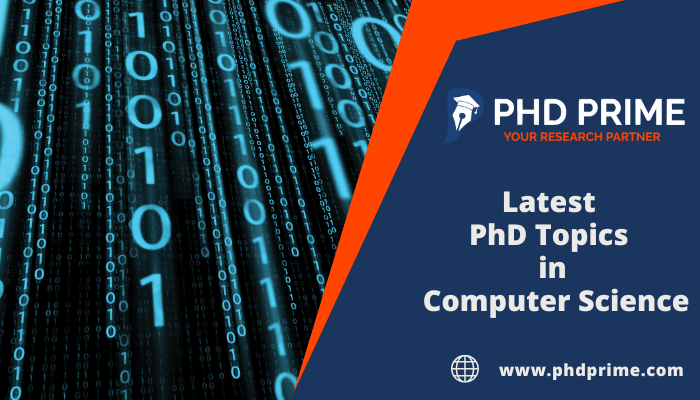
Research Area in Computer Science
- Internet-based mobile ad hoc network (iMANET)
- Smartphone ad hoc network (SPANET)
- Mobile cloud computing
- Soft computing
- Context-aware computing
- Systems and cybernetics
- Learning technologies
- Internet computing
- Information forensics and security
- Dependable and secure computing
- Brain-computer interface
- Audio and language processing
- Wireless sensor networks
- Wireless body area network
- Visual cryptography
- Video streaming
- Vehicular network
- Ad hoc network
- Text mining
- Telecommunication engineering
- Software-defined networking
- Software reengineering
- Service computing (web service)
- Social sensor networks
- Network security and routing
- Cloud computing
- Computer vision and image processing
- Bioinformatics and biotechnology
- Big data and databases
- Cyber security
- Natural language processing
- Embedded systems
- Human-computer interaction
- Networks and security
Frequently, all the research areas in computer science are quite innovative. In addition, we focus on innovative computer science projects and examine all the sections of research works through the models, techniques, algorithms, mechanisms , etc. Now, it’s time to pay equal attention to the consequence of research protocols. So, let us take a glance over the notable protocols that are used in computer science-based projects along with their specifications.
Protocols in Computer Science
- Ad hoc on-demand distance vector is abbreviated as AODV and it is based on the loop-free routing protocol for the ad hoc networks. It is created for the self-starting environment with the mobile nodes along with various network features that include packet loss, link failure, and node mobility
- It is denoted as the reactive and proactive routing protocol in which the routes are revealed as per the necessity
- Dynamic source routing abbreviated as DSR is one of the routing protocols that is used for the functions of wireless mesh networks and it is parallel to the AODV in transmitting the node requests
The above-mentioned are the substantial research protocols along with their descriptions . Thus, you can just contact us to get the finest and latest PhD topics in computer science. Our research experts can help you in all aspects of your research. Now, you can refer to the following to know about the research trends in computer science.
Current Trends in Computer Science
- It is deployed in the process of detecting and segregating the zombie attack based on cloud computing
- Stenography technique is applied in the cloud computing process to develop the security in cloud data
- In the network process, the reduction of fault occurs through the enhancement of green cloud computing
- In cloud computing, the issues are based on load balancing through the usage of a weight-based scheme
- Homomorphic encryption is developed for key sharing and management
- It is deployed in the cloud computing to segregate the virtual side-channel attack
- It is used to develop the cloud data security and watermarking technique in the cloud computing
The following is about the guidelines for research scholars to prepare the finest research work provided by our experienced research professionals.
How to do Good Research in Computer Science?
- Initially, select the research area that you are interested in computer science
- After selecting an area, the researcher has to find an innovative research topic in computer science
- Select good ideas to enhance the state of art
- The real-time implementations are applied
- Possessions based on the selected approach have to be proved and that should be the enhancement of the existing process
- Software tools have to be developed to support the system
- Have to describe the systematic comparison with the other approaches which has the same issue and discuss the advantages and disadvantages of the research notion
- Results based on some research papers have to be accessible
Applications in Computer Science
Manet is deployed to identify some applications in the research areas that are highlighted in the following.
- Detecting the selective forwarding attack in the mobile as hoc networks
- Avoidance of congestion in the mobile ad hoc networks
- It is used in the trust and security-based mechanism of wormhole attack isolation based on Manet
- Scheme is evaluated with the recovery of mobile as hoc network
- Road safety
- Vehicular ad hoc communication
- Environment sensors
The following is the list of research applications in the field of image processing .
- Video processing
- Pattern recognition
- Color processing
- Robot vision
- Encoding and transmission
- Medical field
- Gamma-rayay imaging
In addition, we have highlighted some applications that are related to the bioinformatics research field.
- Modeling and simulation based on proteins, RNA, and DNA are created through tools based on bioinformatics
- It is used to compare the genetic data along with the assistance of bioinformatics tools
- It is deployed in the study of various aspects including protein regulation and expression
- Organization of biological data and text mining has a significant phase in the process
- It is used in the field of genetics for the mutation observation
More than above, the utmost research applications are available in real-time. In overall, it increases the inclusive efficiency in all aspects of the research features. In addition, our research experts have listed down the prominent research topics based on computer science.
- Network and security
- Distributed system
- High-performance computing
- Visualization and graphics
- Geographical information system
- Databases and data mining
- Architectures and compiler optimization
List of Few Latest and Trending Research Topics in Big Data
- The parallel multi-classification algorithm for big data using the extreme learning machine
- Disease prediction through machine learning through big data from the healthcare communities
- Nearest neighbor classification for high-speed big data streams using spark
- Privacy preserving big data publishing: A scalable k-anonymization approach using MapReduce
- Efficient and rapid machine learning algorithms for big data and dynamic varying systems
Software Engineering-Based Topics in Computer Science
- It is used to support team awareness and collaboration, distributed software development, open source communities, and software as the service
- Software modeling and reasoning
- The reasoning and modeling based on software along with the reasoning specifications in security and safety, analysis of model-driven software development, analysis of requirements modifications, and product timeline
- Dependencies of stakeholders
- Enterprise contexts
- Modeling and analysis of software requirements
Latest Computer Networking Topics for Research
- Data security in the local network through the distributed firewalls
- Efficient peer-to-peer keyword searching
- Tolerant routing on mobile ad hoc network
- Hybrid global-local indexing for efficient peer-to-peer information retrieval
- Application of genetic algorithms in network routing
- Bluetooth-based smart sensor networks
- ISO layering model
- Distributed processing and networks
- Delay tolerant network
- Wireless intelligent networking
- Network security and cryptography
The abovementioned are the contemporary and topical research topics based on the computer science research field. In addition, the research experts have highlighted the latest phd topics in computer science domain detailed in the following.
Area-Based Topics Process
- Human-robot interaction
- Digital fabrication
- Critical computing
- UI technologies
- Information visualization
- Information and communication technology and development (ICTD)
- Computer-supported cooperative work
- Computer-supported cooperative learning
- Augmented and virtual reality
- Shape modeling
- Geometry processing
- Computational imaging
- Computing fabrication
- Translating computational tools
- NLP and speech for healthcare and medicine
- Satisfiability in reasoning
- Sequential decision making
- Multi-agentnt system
- Cognitive robotics
- Knowledge representation
- Human motion analysis
- Computational photography
- Object recognition
- Physics-based modeling of shape and appearance
- Cognitive modeling of language acquisition and processing
- Applications of NLP in healthcare and medicine
- Formal perspectives on language
- Applications of NLP in social sciences and humanities
- Machine translation
- Speech processing
Now, let’s have a glance over the list of research tools that are used in the implementation of research in computer science.
Simulation Tools in Computer Science
For your information, our technical professionals from computer science backgrounds have given you some foremost research questions with answers, to what the researchers are looking for.
Research Questions Computer Science
How to implement ad hoc routing protocols using omnet++.
Oment++ environment is implemented through the adaptations and it is enabling for the contrast simulation results with the designs of the Manet application. The routing protocols such as DSR and AODV are used in the process and as the open source code.
How is Hadoop used in big data?
In general, Hadoop is considered as the java and open source framework that is deployed in the process of big data storing. Mapreduce programming model is deployed in Hadoop for the speed process of data storage.
What are the trending technologies in computer science?
- Artificial intelligence (AI)
- Everything as a service
- Human augmentation
- Big data analytics
- Intelligent process automation (IPA)
- Internet of behaviors (IoB)
- 5G technology
What are the major areas in the field of computer science?
- Theory of computing
- Bioinformatics
- Software engineering
- Programming languages
- Numerical analysis
- Vision and Graphics
- Human-computerer interaction
- Database systems
- Computer systems and network security
How to implement artificial intelligence in python?
Generally, this process includes four significant steps and they are highlighted in the following.
- Organizational and AI capabilities that are essential for digital transformation are apprehended
- Business ecosystem role, the potential for BMI, and current BM are comprehended
- Capabilities are enhanced and cultivated for the AI execution
- Internal is developed and organizational acceptance is reached
- Tensor flow
Taking everything into account, the research scholars can grasp any innovative and latest PhD topics in computer science from our research experts. Consequently, we guide research scholars in all stages. In the same way, we make discussions with you at all stages of the research work. So, scholars can closely track the research work from everywhere in the world. Additionally, our well-experienced research professionals will provide significant assistance throughout your research process.

Opening Hours
- Mon-Sat 09.00 am – 6.30 pm
- Lunch Time 12.30 pm – 01.30 pm
- Break Time 04.00 pm – 04.30 pm
- 18 years service excellence
- 40+ country reach
- 36+ university mou
- 194+ college mou
- 6000+ happy customers
- 100+ employees
- 240+ writers
- 60+ developers
- 45+ researchers
- 540+ Journal tieup
Payment Options

Our Clients

Social Links

- Terms of Use

Opening Time

Closing Time
- We follow Indian time zone

For enquiries call:
+1-469-442-0620

- Programming
Latest Computer Science Research Topics for 2024
Home Blog Programming Latest Computer Science Research Topics for 2024
Everybody sees a dream—aspiring to become a doctor, astronaut, or anything that fits your imagination. If you were someone who had a keen interest in looking for answers and knowing the “why” behind things, you might be a good fit for research. Further, if this interest revolved around computers and tech, you would be an excellent computer researcher!
As a tech enthusiast, you must know how technology is making our life easy and comfortable. With a single click, Google can get you answers to your silliest query or let you know the best restaurants around you. Do you know what generates that answer? Want to learn about the science going on behind these gadgets and the internet?
For this, you will have to do a bit of research. Here we will learn about top computer science thesis topics and computer science thesis ideas.
Why is Research in Computer Science Important?
Computers and technology are becoming an integral part of our lives. We are dependent on them for most of our work. With the changing lifestyle and needs of the people, continuous research in this sector is required to ease human work. However, you need to be a certified researcher to contribute to the field of computers. You can check out Advance Computer Programming certification to learn and advance in the versatile language and get hands-on experience with all the topics of C# application development.
1. Innovation in Technology
Research in computer science contributes to technological advancement and innovations. We end up discovering new things and introducing them to the world. Through research, scientists and engineers can create new hardware, software, and algorithms that improve the functionality, performance, and usability of computers and other digital devices.
2. Problem-Solving Capabilities
From disease outbreaks to climate change, solving complex problems requires the use of advanced computer models and algorithms. Computer science research enables scholars to create methods and tools that can help in resolving these challenging issues in a blink of an eye.
3. Enhancing Human Life
Computer science research has the potential to significantly enhance human life in a variety of ways. For instance, researchers can produce educational software that enhances student learning or new healthcare technology that improves clinical results. If you wish to do Ph.D., these can become interesting computer science research topics for a PhD.
4. Security Assurance
As more sensitive data is being transmitted and kept online, security is our main concern. Computer science research is crucial for creating new security systems and tactics that defend against online threats.
Top Computer Science Research Topics
Before starting with the research, knowing the trendy research paper ideas for computer science exploration is important. It is not so easy to get your hands on the best research topics for computer science; spend some time and read about the following mind-boggling ideas before selecting one.
1. Integrated Blockchain and Edge Computing Systems: A Survey, Some Research Issues, and Challenges
Welcome to the era of seamless connectivity and unparalleled efficiency! Blockchain and edge computing are two cutting-edge technologies that have the potential to revolutionize numerous sectors. Blockchain is a distributed ledger technology that is decentralized and offers a safe and transparent method of storing and transferring data.
As a young researcher, you can pave the way for a more secure, efficient, and scalable architecture that integrates blockchain and edge computing systems. So, let's roll up our sleeves and get ready to push the boundaries of technology with this exciting innovation!
Blockchain helps to reduce latency and boost speed. Edge computing, on the other hand, entails processing data close to the generation source, such as sensors and IoT devices. Integrating edge computing with blockchain technologies can help to achieve safer, more effective, and scalable architecture.
Moreover, this research title for computer science might open doors of opportunities for you in the financial sector.
2. A Survey on Edge Computing Systems and Tools
With the rise in population, the data is multiplying by manifolds each day. It's high time we find efficient technology to store it. However, more research is required for the same.
Say hello to the future of computing with edge computing! The edge computing system can store vast amounts of data to retrieve in the future. It also provides fast access to information in need. It maintains computing resources from the cloud and data centers while processing.
Edge computing systems bring processing power closer to the data source, resulting in faster and more efficient computing. But what tools are available to help us harness the power of edge computing?
As a part of this research, you will look at the newest edge computing tools and technologies to see how they can improve your computing experience. Here are some of the tools you might get familiar with upon completion of this research:
- Apache NiFi: A framework for data processing that enables users to gather, transform, and transfer data from edge devices to cloud computing infrastructure.
- Microsoft Azure IoT Edge: A platform in the cloud that enables the creation and deployment of cutting-edge intelligent applications.
- OpenFog Consortium: An organization that supports the advancement of fog computing technologies and architectures is the OpenFog Consortium.
3. Machine Learning: Algorithms, Real-world Applications, and Research Directions
Machine learning is the superset of Artificial Intelligence; a ground-breaking technology used to train machines to mimic human action and work. ML is used in everything from virtual assistants to self-driving cars and is revolutionizing the way we interact with computers. But what is machine learning exactly, and what are some of its practical uses and future research directions?
To find answers to such questions, it can be a wonderful choice to pick from the pool of various computer science dissertation ideas.
You will discover how computers learn several actions without explicit programming and see how they perform beyond their current capabilities. However, to understand better, having some basic programming knowledge always helps. KnowledgeHut’s Programming course for beginners will help you learn the most in-demand programming languages and technologies with hands-on projects.
During the research, you will work on and study
- Algorithm: Machine learning includes many algorithms, from decision trees to neural networks.
- Applications in the Real-world: You can see the usage of ML in many places. It can early detect and diagnose diseases like cancer. It can detect fraud when you are making payments. You can also use it for personalized advertising.
- Research Trend: The most recent developments in machine learning research, include explainable AI, reinforcement learning, and federated learning.
While a single research paper is not enough to bring the light on an entire domain as vast as machine learning; it can help you witness how applicable it is in numerous fields, like engineering, data science & analysis, business intelligence, and many more.
Whether you are a data scientist with years of experience or a curious tech enthusiast, machine learning is an intriguing and vital field that's influencing the direction of technology. So why not dig deeper?
4. Evolutionary Algorithms and their Applications to Engineering Problems
Imagine a system that can solve most of your complex queries. Are you interested to know how these systems work? It is because of some algorithms. But what are they, and how do they work? Evolutionary algorithms use genetic operators like mutation and crossover to build new generations of solutions rather than starting from scratch.
This research topic can be a choice of interest for someone who wants to learn more about algorithms and their vitality in engineering.
Evolutionary algorithms are transforming the way we approach engineering challenges by allowing us to explore enormous solution areas and optimize complex systems.
The possibilities are infinite as long as this technology is developed further. Get ready to explore the fascinating world of evolutionary algorithms and their applications in addressing engineering issues.
5. The Role of Big Data Analytics in the Industrial Internet of Things
Datasets can have answers to most of your questions. With good research and approach, analyzing this data can bring magical results. Welcome to the world of data-driven insights! Big Data Analytics is the transformative process of extracting valuable knowledge and patterns from vast and complex datasets, boosting innovation and informed decision-making.
This field allows you to transform the enormous amounts of data produced by IoT devices into insightful knowledge that has the potential to change how large-scale industries work. It's like having a crystal ball that can foretell.
Big data analytics is being utilized to address some of the most critical issues, from supply chain optimization to predictive maintenance. Using it, you can find patterns, spot abnormalities, and make data-driven decisions that increase effectiveness and lower costs for several industrial operations by analyzing data from sensors and other IoT devices.
The area is so vast that you'll need proper research to use and interpret all this information. Choose this as your computer research topic to discover big data analytics' most compelling applications and benefits. You will see that a significant portion of industrial IoT technology demands the study of interconnected systems, and there's nothing more suitable than extensive data analysis.
6. An Efficient Lightweight Integrated Blockchain (ELIB) Model for IoT Security and Privacy
Are you concerned about the security and privacy of your Internet of Things (IoT) devices? As more and more devices become connected, it is more important than ever to protect the security and privacy of data. If you are interested in cyber security and want to find new ways of strengthening it, this is the field for you.
ELIB is a cutting-edge solution that offers private and secure communication between IoT devices by fusing the strength of blockchain with lightweight cryptography. This architecture stores encrypted data on a distributed ledger so only parties with permission can access it.
But why is ELIB so practical and portable? ELIB uses lightweight cryptography to provide quick and effective communication between devices, unlike conventional blockchain models that need complicated and resource-intensive computations.
Due to its increasing vitality, it is gaining popularity as a research topic as someone aware that this framework works and helps reinstate data security is highly demanded in financial and banking.
7. Natural Language Processing Techniques to Reveal Human-Computer Interaction for Development Research Topics
Welcome to the world where machines decode the beauty of the human language. With natural language processing (NLP) techniques, we can analyze the interactions between humans and computers to reveal valuable insights for development research topics. It is also one of the most crucial PhD topics in computer science as NLP-based applications are gaining more and more traction.
Etymologically, natural language processing (NLP) is a potential technique that enables us to examine and comprehend natural language data, such as discussions between people and machines. Insights on user behaviour, preferences, and pain areas can be gleaned from these encounters utilizing NLP approaches.
But which specific areas should we leverage on using NLP methods? This is precisely what you’ll discover while doing this computer science research.
Gear up to learn more about the fascinating field of NLP and how it can change how we design and interact with technology, whether you are a UX designer, a data scientist, or just a curious tech lover and linguist.
8. All One Needs to Know About Fog Computing and Related Edge Computing Paradigms: A Complete Survey
If you are an IoT expert or a keen lover of the Internet of Things, you should leap and move forward to discovering Fog Computing. With the rise of connected devices and the Internet of Things (IoT), traditional cloud computing models are no longer enough. That's where fog computing and related edge computing paradigms come in.
Fog computing is a distributed approach that brings processing and data storage closer to the devices that generate and consume data by extending cloud computing to the network's edge.
As computing technologies are significantly used today, the area has become a hub for researchers to delve deeper into the underlying concepts and devise more and more fog computing frameworks. You can also contribute to and master this architecture by opting for this stand-out topic for your research.
Tips and Tricks to Write Computer Research Topics
Before starting to explore these hot research topics in computer science you may have to know about some tips and tricks that can easily help you.
- Know your interest.
- Choose the topic wisely.
- Make proper research about the demand of the topic.
- Get proper references.
- Discuss with experts.
By following these tips and tricks, you can write a compelling and impactful computer research topic that contributes to the field's advancement and addresses important research gaps.
From machine learning and artificial intelligence to blockchain, edge computing, and big data analytics, numerous trending computer research topics exist to explore.
One of the most important trends is using cutting-edge technology to address current issues. For instance, new IIoT security and privacy opportunities are emerging by integrating blockchain and edge computing. Similarly, the application of natural language processing methods is assisting in revealing human-computer interaction and guiding the creation of new technologies.
Another trend is the growing emphasis on sustainability and moral considerations in technological development. Researchers are looking into how computer science might help in innovation.
With the latest developments and leveraging cutting-edge tools and techniques, researchers can make meaningful contributions to the field and help shape the future of technology. Going for Full-stack Developer online training will help you master the latest tools and technologies.
Frequently Asked Questions (FAQs)
Research in computer science is mainly focused on different niches. It can be theoretical or technical as well. It completely depends upon the candidate and his focused area. They may do research for inventing new algorithms or many more to get advanced responses in that field.
Yes, moreover it would be a very good opportunity for the candidate. Because computer science students may have a piece of knowledge about the topic previously. They may find Easy thesis topics for computer science to fulfill their research through KnowledgeHut.
There are several scopes available for computer science. A candidate can choose different subjects such as AI, database management, software design, graphics, and many more.

Ramulu Enugurthi
Ramulu Enugurthi, a distinguished computer science expert with an M.Tech from IIT Madras, brings over 15 years of software development excellence. Their versatile career spans gaming, fintech, e-commerce, fashion commerce, mobility, and edtech, showcasing adaptability in multifaceted domains. Proficient in building distributed and microservices architectures, Ramulu is renowned for tackling modern tech challenges innovatively. Beyond technical prowess, he is a mentor, sharing invaluable insights with the next generation of developers. Ramulu's journey of growth, innovation, and unwavering commitment to excellence continues to inspire aspiring technologists.
Avail your free 1:1 mentorship session.
Something went wrong
Upcoming Programming Batches & Dates
- Our Promise
- Our Achievements
- Our Mission
- Proposal Writing
- System Development
- Paper Writing
- Paper Publish
- Synopsis Writing
- Thesis Writing
- Assignments
- Survey Paper
- Conference Paper
- Journal Paper
- Empirical Paper
- Journal Support
- Computer Science Research Topics for PhD
- Green cloud computing
- ML and DL approaches for computer vision
- Intelligent cyber-physical system
- Imaging techniques
- Biometrics system
- Content based internet computing
- Indistinct vision
- Less exposure
- Problem with research topic
- Not able to converge Novel, Handy, Latest topics
- Objective issues
- Publication, citation counts
- Opportunities in research
- Impact on real world
- Adaptability
- Number of papers issued in high-level journals
- Research chances under the topic
- Number of international conferences
Computer Science Research Topics for PhD is a full research team to discover your work. It is a desire for the up-and-coming scholars to attain the best. Without a doubt, you can know the depth of your work.To fix this issue, we bring our Computer science research topics for PhD services.
In computer science, we will explore 145+ areas and 100000+ topics in the current trend. Seeing that, research topic selection is not the long term process for PhD students. On this page, we will offer you the latest topics in computer science. It is more useful for you in the topic selection process.
Computer science research topics for PhD
- Software-defined cloud computing
- Virtualized cloud environment
- Multi-dimensional, multi-resolution imaging techniques
- Virtual and augmented reality
- Content-based internet computing
- Novel biometrics methods
- Cloud RAN, Fog RAN, Edge RAN designs
Earlier topics afford merely for your reference. To know more or get the topics, you simply email us at our business time. With our support, more than 5000+ scholars have achieved their goal promptly!!!
General glitches you are facing in topics selection are,
- Unclear vision on domain
- Less exposure to find a research topic
- Issues in framing objectives and questions
- Unable to gather enough number of papers
- Problem with narrowing your research topic
All these problems will not impact your research when you are under our service, so that you can feel free to clear all your doubts directly with our experts online/offline.
We measure the emphasis of each research topic is based on the,
- Impact of the topics in real-world as well as a research society
- Apt and flexible research topic
Inbox us your intent domain to get your topics index, Get you within a working day from Computer science research topics for PhD . On the whole, your aim without a plan is just a wish. Your strategy without execution is just an idea. Your execution without us is just an end, but not a feat.
MILESTONE 1: Research Proposal
Finalize journal (indexing).
Before sit down to research proposal writing, we need to decide exact journals. For e.g. SCI, SCI-E, ISI, SCOPUS.
Research Subject Selection
As a doctoral student, subject selection is a big problem. Phdservices.org has the team of world class experts who experience in assisting all subjects. When you decide to work in networking, we assign our experts in your specific area for assistance.
Research Topic Selection
We helping you with right and perfect topic selection, which sound interesting to the other fellows of your committee. For e.g. if your interest in networking, the research topic is VANET / MANET / any other
Literature Survey Writing
To ensure the novelty of research, we find research gaps in 50+ latest benchmark papers (IEEE, Springer, Elsevier, MDPI, Hindawi, etc.)
Case Study Writing
After literature survey, we get the main issue/problem that your research topic will aim to resolve and elegant writing support to identify relevance of the issue.
Problem Statement
Based on the research gaps finding and importance of your research, we conclude the appropriate and specific problem statement.
Writing Research Proposal
Writing a good research proposal has need of lot of time. We only span a few to cover all major aspects (reference papers collection, deficiency finding, drawing system architecture, highlights novelty)
MILESTONE 2: System Development
Fix implementation plan.
We prepare a clear project implementation plan that narrates your proposal in step-by step and it contains Software and OS specification. We recommend you very suitable tools/software that fit for your concept.
Tools/Plan Approval
We get the approval for implementation tool, software, programing language and finally implementation plan to start development process.
Pseudocode Description
Our source code is original since we write the code after pseudocodes, algorithm writing and mathematical equation derivations.
Develop Proposal Idea
We implement our novel idea in step-by-step process that given in implementation plan. We can help scholars in implementation.
Comparison/Experiments
We perform the comparison between proposed and existing schemes in both quantitative and qualitative manner since it is most crucial part of any journal paper.
Graphs, Results, Analysis Table
We evaluate and analyze the project results by plotting graphs, numerical results computation, and broader discussion of quantitative results in table.
Project Deliverables
For every project order, we deliver the following: reference papers, source codes screenshots, project video, installation and running procedures.
MILESTONE 3: Paper Writing
Choosing right format.
We intend to write a paper in customized layout. If you are interesting in any specific journal, we ready to support you. Otherwise we prepare in IEEE transaction level.
Collecting Reliable Resources
Before paper writing, we collect reliable resources such as 50+ journal papers, magazines, news, encyclopedia (books), benchmark datasets, and online resources.
Writing Rough Draft
We create an outline of a paper at first and then writing under each heading and sub-headings. It consists of novel idea and resources
Proofreading & Formatting
We must proofread and formatting a paper to fix typesetting errors, and avoiding misspelled words, misplaced punctuation marks, and so on
Native English Writing
We check the communication of a paper by rewriting with native English writers who accomplish their English literature in University of Oxford.
Scrutinizing Paper Quality
We examine the paper quality by top-experts who can easily fix the issues in journal paper writing and also confirm the level of journal paper (SCI, Scopus or Normal).
Plagiarism Checking
We at phdservices.org is 100% guarantee for original journal paper writing. We never use previously published works.
MILESTONE 4: Paper Publication
Finding apt journal.
We play crucial role in this step since this is very important for scholar’s future. Our experts will help you in choosing high Impact Factor (SJR) journals for publishing.
Lay Paper to Submit
We organize your paper for journal submission, which covers the preparation of Authors Biography, Cover Letter, Highlights of Novelty, and Suggested Reviewers.
Paper Submission
We upload paper with submit all prerequisites that are required in journal. We completely remove frustration in paper publishing.
Paper Status Tracking
We track your paper status and answering the questions raise before review process and also we giving you frequent updates for your paper received from journal.
Revising Paper Precisely
When we receive decision for revising paper, we get ready to prepare the point-point response to address all reviewers query and resubmit it to catch final acceptance.
Get Accept & e-Proofing
We receive final mail for acceptance confirmation letter and editors send e-proofing and licensing to ensure the originality.
Publishing Paper
Paper published in online and we inform you with paper title, authors information, journal name volume, issue number, page number, and DOI link
MILESTONE 5: Thesis Writing
Identifying university format.
We pay special attention for your thesis writing and our 100+ thesis writers are proficient and clear in writing thesis for all university formats.
Gathering Adequate Resources
We collect primary and adequate resources for writing well-structured thesis using published research articles, 150+ reputed reference papers, writing plan, and so on.
Writing Thesis (Preliminary)
We write thesis in chapter-by-chapter without any empirical mistakes and we completely provide plagiarism-free thesis.
Skimming & Reading
Skimming involve reading the thesis and looking abstract, conclusions, sections, & sub-sections, paragraphs, sentences & words and writing thesis chorological order of papers.
Fixing Crosscutting Issues
This step is tricky when write thesis by amateurs. Proofreading and formatting is made by our world class thesis writers who avoid verbose, and brainstorming for significant writing.
Organize Thesis Chapters
We organize thesis chapters by completing the following: elaborate chapter, structuring chapters, flow of writing, citations correction, etc.
Writing Thesis (Final Version)
We attention to details of importance of thesis contribution, well-illustrated literature review, sharp and broad results and discussion and relevant applications study.
How PhDservices.org deal with significant issues ?
1. novel ideas.
Novelty is essential for a PhD degree. Our experts are bringing quality of being novel ideas in the particular research area. It can be only determined by after thorough literature search (state-of-the-art works published in IEEE, Springer, Elsevier, ACM, ScienceDirect, Inderscience, and so on). SCI and SCOPUS journals reviewers and editors will always demand “Novelty” for each publishing work. Our experts have in-depth knowledge in all major and sub-research fields to introduce New Methods and Ideas. MAKING NOVEL IDEAS IS THE ONLY WAY OF WINNING PHD.
2. Plagiarism-Free
To improve the quality and originality of works, we are strictly avoiding plagiarism since plagiarism is not allowed and acceptable for any type journals (SCI, SCI-E, or Scopus) in editorial and reviewer point of view. We have software named as “Anti-Plagiarism Software” that examines the similarity score for documents with good accuracy. We consist of various plagiarism tools like Viper, Turnitin, Students and scholars can get your work in Zero Tolerance to Plagiarism. DONT WORRY ABOUT PHD, WE WILL TAKE CARE OF EVERYTHING.
3. Confidential Info
We intended to keep your personal and technical information in secret and it is a basic worry for all scholars.
- Technical Info: We never share your technical details to any other scholar since we know the importance of time and resources that are giving us by scholars.
- Personal Info: We restricted to access scholars personal details by our experts. Our organization leading team will have your basic and necessary info for scholars.
CONFIDENTIALITY AND PRIVACY OF INFORMATION HELD IS OF VITAL IMPORTANCE AT PHDSERVICES.ORG. WE HONEST FOR ALL CUSTOMERS.
4. Publication
Most of the PhD consultancy services will end their services in Paper Writing, but our PhDservices.org is different from others by giving guarantee for both paper writing and publication in reputed journals. With our 18+ year of experience in delivering PhD services, we meet all requirements of journals (reviewers, editors, and editor-in-chief) for rapid publications. From the beginning of paper writing, we lay our smart works. PUBLICATION IS A ROOT FOR PHD DEGREE. WE LIKE A FRUIT FOR GIVING SWEET FEELING FOR ALL SCHOLARS.
5. No Duplication
After completion of your work, it does not available in our library i.e. we erased after completion of your PhD work so we avoid of giving duplicate contents for scholars. This step makes our experts to bringing new ideas, applications, methodologies and algorithms. Our work is more standard, quality and universal. Everything we make it as a new for all scholars. INNOVATION IS THE ABILITY TO SEE THE ORIGINALITY. EXPLORATION IS OUR ENGINE THAT DRIVES INNOVATION SO LET’S ALL GO EXPLORING.
Client Reviews
I ordered a research proposal in the research area of Wireless Communications and it was as very good as I can catch it.
I had wishes to complete implementation using latest software/tools and I had no idea of where to order it. My friend suggested this place and it delivers what I expect.
It really good platform to get all PhD services and I have used it many times because of reasonable price, best customer services, and high quality.
My colleague recommended this service to me and I’m delighted their services. They guide me a lot and given worthy contents for my research paper.
I’m never disappointed at any kind of service. Till I’m work with professional writers and getting lot of opportunities.
- Christopher
Once I am entered this organization I was just felt relax because lots of my colleagues and family relations were suggested to use this service and I received best thesis writing.
I recommend phdservices.org. They have professional writers for all type of writing (proposal, paper, thesis, assignment) support at affordable price.
You guys did a great job saved more money and time. I will keep working with you and I recommend to others also.
These experts are fast, knowledgeable, and dedicated to work under a short deadline. I had get good conference paper in short span.
Guys! You are the great and real experts for paper writing since it exactly matches with my demand. I will approach again.
I am fully satisfied with thesis writing. Thank you for your faultless service and soon I come back again.
Trusted customer service that you offer for me. I don’t have any cons to say.
I was at the edge of my doctorate graduation since my thesis is totally unconnected chapters. You people did a magic and I get my complete thesis!!!
- Abdul Mohammed
Good family environment with collaboration, and lot of hardworking team who actually share their knowledge by offering PhD Services.
I enjoyed huge when working with PhD services. I was asked several questions about my system development and I had wondered of smooth, dedication and caring.
I had not provided any specific requirements for my proposal work, but you guys are very awesome because I’m received proper proposal. Thank you!
- Bhanuprasad
I was read my entire research proposal and I liked concept suits for my research issues. Thank you so much for your efforts.
- Ghulam Nabi
I am extremely happy with your project development support and source codes are easily understanding and executed.
Hi!!! You guys supported me a lot. Thank you and I am 100% satisfied with publication service.
- Abhimanyu
I had found this as a wonderful platform for scholars so I highly recommend this service to all. I ordered thesis proposal and they covered everything. Thank you so much!!!
Related Pages
Thesis Topics For Computer Science Phd
Write My Phd Dissertation For Me
Write My Phd Project For Me
Write My Phd Proposal For Me
Write My Phd Synopsis For Me
Write My Phd Thesis For Me
Writing Help Your Phd Projects
Writing Help Your Phd Research Code Development
Writing Help Your Phd Research Dissertation Writing
Writing Help Your Phd Research Paper Publication
Writing Help Your Phd Research Paper
Writing Help Your Phd Research Proposal
Writing Help Your Phd Research System Development
Writing Help Your Phd Research Thesis Writing
Write My Phd Code For Me
UMD Ph.D. Student Snehesh Shrestha's Software Uses AI to Teach You How to Play the Violin

On the ground floor of one of the new computer buildings at the University of Maryland, Anna Kelleher played her centuries-old violin while a program running on a laptop in front of her told her to do things such as raise her chin or widen her stance.
These were common mistakes that Kelleher knows not to do. After all, she’s a graduate student studying violin performance. But she also teaches violin to others, and the program she was demonstrating might someday help those she teaches to play even better.
Believers in artificial intelligence say the program will radically transform our lives in so many ways.
It’s designed by Snehesh Shrestha , a Ph.D. candidate at the Department of Computer Science, and is the perfect example of how the University of Maryland is building bridges between AI and every other academic program on campus.
A simple webcam found on your laptop, or even your phone, captures enough movement and audio from your performance that the AI program can tell what you’re doing wrong. Whether your stance is too wide or narrow, to whether or not your chin is in the right spot, it can see and also hear everything you’re doing right and wrong.
The program was designed to try “to understand the whole space, not just blindly building a technology, but understanding how can we fill the gaps that are currently there in the entire music learning process,” Shrestha said. “And by identifying gaps where we can empower the teacher and the students, we could really build something a lot more powerful than just building a single technology. And that really was like the starting point of exploring into what the technology can provide towards the future direction of music education.”
On the monitor, the teacher can see the student in 3D — every angle imaginable — to see how they stand and how they move. Technology, including a piece that looks sort of like a smartwatch, can also send cues to the student through vibrations in the wrist.
Click HERE to read the full article
The Department welcomes comments, suggestions and corrections. Send email to editor [-at-] cs [dot] umd [dot] edu .
Thank you for visiting nature.com. You are using a browser version with limited support for CSS. To obtain the best experience, we recommend you use a more up to date browser (or turn off compatibility mode in Internet Explorer). In the meantime, to ensure continued support, we are displaying the site without styles and JavaScript.
- View all journals
- Explore content
- About the journal
- Publish with us
- Sign up for alerts
Latest science news, discoveries and analysis

Could a rare mutation that causes dwarfism also slow ageing?

Bird flu in US cows: is the milk supply safe?

Future of Humanity Institute shuts: what's next for ‘deep future’ research?

Judge dismisses superconductivity physicist’s lawsuit against university
Nih pay raise for postdocs and phd students could have us ripple effect, hello puffins, goodbye belugas: changing arctic fjord hints at our climate future, china's moon atlas is the most detailed ever made, ‘shut up and calculate’: how einstein lost the battle to explain quantum reality, ecologists: don’t lose touch with the joy of fieldwork chris mantegna.

Should the Maldives be creating new land?

Lethal AI weapons are here: how can we control them?

Algorithm ranks peer reviewers by reputation — but critics warn of bias

How gliding marsupials got their ‘wings’
Bird flu virus has been spreading in us cows for months, rna reveals, audio long read: why loneliness is bad for your health, nato is boosting ai and climate research as scientific diplomacy remains on ice, rat neurons repair mouse brains — and restore sense of smell.

Retractions are part of science, but misconduct isn’t — lessons from a superconductivity lab

Any plan to make smoking obsolete is the right step

Citizenship privilege harms science
European ruling linking climate change to human rights could be a game changer — here’s how charlotte e. blattner, will ai accelerate or delay the race to net-zero emissions, current issue.

The Maldives is racing to create new land. Why are so many people concerned?
Surprise hybrid origins of a butterfly species, stripped-envelope supernova light curves argue for central engine activity, optical clocks at sea, research analysis.

Ancient DNA traces family lines and political shifts in the Avar empire
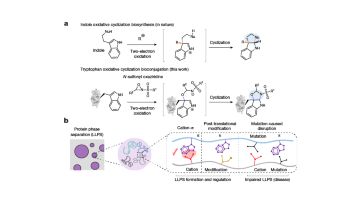
A chemical method for selective labelling of the key amino acid tryptophan
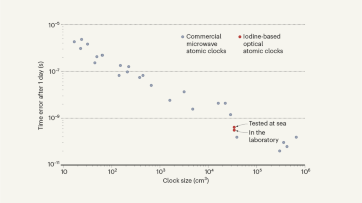
Robust optical clocks promise stable timing in a portable package

Targeting RNA opens therapeutic avenues for Timothy syndrome
Bioengineered ‘mini-colons’ shed light on cancer progression, galaxy found napping in the primordial universe, tumours form without genetic mutations, marsupial genomes reveal how a skin membrane for gliding evolved.

Scientists urged to collect royalties from the ‘magic money tree’

Breaking ice, and helicopter drops: winning photos of working scientists

Shrouded in secrecy: how science is harmed by the bullying and harassment rumour mill
Want to make a difference try working at an environmental non-profit organization, how ground glass might save crops from drought on a caribbean island, books & culture.

How volcanoes shaped our planet — and why we need to be ready for the next big eruption

Dogwhistles, drilling and the roots of Western civilization: Books in brief

Cosmic rentals
Las borinqueñas remembers the forgotten puerto rican women who tested the first pill, dad always mows on summer saturday mornings, nature podcast.

Latest videos
Nature briefing.
An essential round-up of science news, opinion and analysis, delivered to your inbox every weekday.
Quick links
- Explore articles by subject
- Guide to authors
- Editorial policies
- Request Info
- Life at Dickinson
- Tuition & Aid
- News & Events
- Alumni in Action
- Dickinson Magazine
- Global Study and Engagement
- Sustainability
- Latest news /
- Computer Science Major Jobs and Graduate School Acceptances 2024 /
Computer Science Major Jobs and Graduate School Acceptances 2024
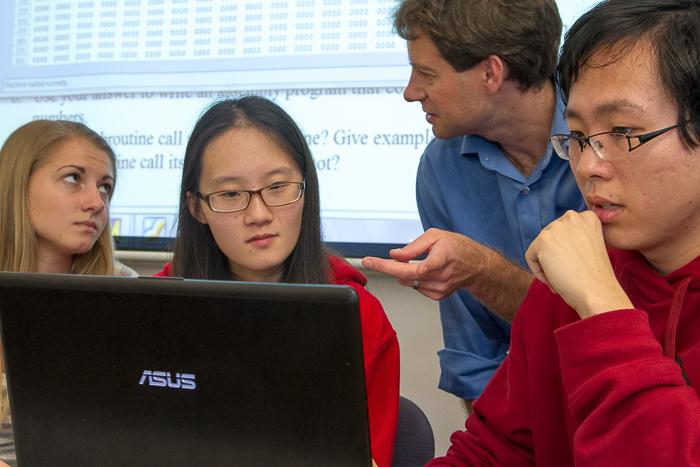
computer science
Hailie Mitchell
Hometown: Ho Chi Minh City, Vietnam Major: computer science Employer: Google Job title: software engineer
How has Dickinson prepared you for life after graduation?
At Dickinson, I've had the opportunity to take interesting classes that blend my passions for the arts, music and tech, guided by supportive faculty. My study abroad experience in Italy was absolutely unforgettable and truly essential; it not only broadened my horizons but also sharpened my decision-making and creativity. My computer science classes have also been crucial in developing both soft and hard skills for tackling real-world challenges in my future career.
- Google, New York, software engineer intern, summer 2023
- Google, New York, STEP intern, summer 2022
- Applied Insight LLC, Hanover, Md.
TAKE THE NEXT STEPS
- Request Information
- Read More Dickinson News
Published April 11, 2024
Events All events
Junior open house, senior saturday, warbler walk, baseball vs swarthmore.
- School of Engineering and Applied Sciences >
- Diversity & Inclusion >
- Camps for 6-12 Grade >
- CSExplore Camp >
- Ziarek, Lukasz (Luke)
Lukasz (Luke) Ziarek

Research Topics
Concurrency/parallelism; real-time Java; session types for distributed systems; visual debugging
Contact Information
338E Davis Hall
Buffalo NY, 14260
Phone: (716) 645-1596
Related Links
- PhD, Computer Science, Purdue University, 2011
- BS, Computer Science, University of Chicago, 2003
- IEEE Region One Technological Innovation (Academic) Award, 2023
- President Emeritus and Mrs. Meyerson Award for Distinguished Undergraduate Teaching and Mentoring, 2022
- NSF CAREER Award , 2018
- SEAS Early Career Teacher of the Year , 2016
- Halstead Award for Outstanding Research in Software Engineering, 2009
- Intel Fellowship, 2008
- GAANN Fellowship, 2004
Virginia Tech’s College of Engineering ranks highly in the U.S. News & World Report Graduate Rankings for 2024
The college was ranked 31st in the nation, and rose in its aerospace, biological, systems, and computer engineering programs, while holding steady in civil and environmental engineering.
- Chelsea Seeber and
- Florence Gonsalves
- Share on Facebook
- Share on Twitter
- Copy address link to clipboard

Several of the graduate programs in Virginia Tech’s College of Engineering have earned coveted spots in the top 20 of the latest U.S. News & World Report rankings . Notably, the computer engineering program rose eight spots, from No. 23 to No. 15. The university’s goal to seek solutions to the world’s most complex problems through research and innovation is demonstrated throughout the college’s 13 departments and schools thanks to the top-notch faculty and graduate student research at its Blacksburg campus and its growing presence in the D.C. area.
The 2024 programs ranked in the top 10 include:
Environmental Engineering No. 5
Graduate Systems Engineering program No. 5 (up from No. 6)
Civil Engineering No. 9
Biological/Agricultural program No. 10 (up from No. 12)
Other programs that fared well include graduate aerospace/astronautical/aeronautical up from No. 14 to No. 11. Mechanical, electrical, and nuclear engineering programs also all cracked the top 20.
“The College of Engineering has been a key player in many of these top-ranked program areas for several years. Thanks to the expertise of our faculty and researchers, we are continuing to find innovative solutions through deep, diverse partnerships here at Virginia Tech, in industry, and around the world,” said Pam VandeVord , Associate Dean for Research and Innovation.
In 2023, 57 faculty from the College of Engineering won 75 awards, with 14 of those awards being categorized as “prestigious” or “highly prestigious” by the National Research Council. In addition, the college makes up more than 40 percent of the university’s total research expenditures and is continuing to diversify revenue streams with more National Institute of Health proposals, transdisciplinary projects, and center-level initiatives.
“It is our mission to advance the boundaries of engineering knowledge and practice through transdisciplinary research,” said Julie Ross , the Paul and Dorothea Torgersen Dean of Engineering. “The caliber of our world class education is truly reflected in our students, faculty, and alumni, who are sought globally for their excellence. We invest in the resources that prepare our graduates to solve today’s most complex social and technological challenges in and beyond their communities.”
The Innovation Campus , opening in 2025, will expand upon opportunities to prepare computer engineers and computer scientists to lead the frontier of wireless technologies, artificial intelligence, cybersecurity, and more, while being immersed in one of the most connected tech communities in the country. Its two Master of Engineering programs in computer science and computer engineering are both industry-connected degrees that will provide students with a deep technical base while expanding their professional skills and preparing them to assume leadership roles. Students will gain expertise in areas such as machine learning, secure information systems and networks, and quantum computing.
The success of the college’s graduate programs depends on numerous forms of support for students, postdoctoral researchers, and new and seasoned faculty. Through scholarships that decrease barriers not only for students, but junior faculty, the college is able to develop, attract, and retain top talent. In 2023 alone, the college received eight National Science Foundation CAREER awards, the most prestigious given by the foundation to junior faculty who exemplify leadership as teacher-scholars in research and education. It also had four Clarivate Highly Cited Researchers, which validates excellence in research, reputation, and collaboration, and acts as a beacon for academic institutions and commercial organizations. These are among a plethora of accolades that make the college’s graduate engineering programs a destination for top talent in 2024.
VandeVord added, “Moving forward, we will continue to push the envelope in spaces such as civil and environmental engineering, computer engineering, systems engineering, aerospace engineering and agricultural engineering, where we have demonstrated longstanding success. In addition, we are making headway in new areas like health care research, wireless, artificial intelligence, and additive manufacturing, among others, to distinguish ourselves in these growing fields that live within our biomedical, mechanical and electrical engineering programs.”
Chelsea Seeber
540-231-2108
- Aerospace and Ocean Engineering
- Biological Systems Engineering
- Civil and Environmental Engineering
- College of Engineering
- Computer Science
- Electrical and Computer Engineering
- Graduate Education
- Industrial and Systems Engineering
- Innovation Campus
- Mechanical Engineering
- News directly from around campus
Related Content

Artificial intelligence can develop treatments to prevent 'superbugs'
Researchers used reinforcement learning to design antibiotic regimens to prevent treatment resistance.
Cleveland Clinic researchers developed an artficial intelligence (AI) model that can determine the best combination and timeline to use when prescribing drugs to treat a bacterial infection, based solely on how quickly the bacteria grow given certain perturbations. A team led by Jacob Scott, MD, PhD, and his lab in the Theory Division of Translational Hematology and Oncology, recently published their findings in PNAS .
Antibiotics are credited with increasing the average US lifespan by almost ten years. Treatment lowered fatality rates for health issues we now consider minor -- like some cuts and injuries. But antibiotics aren't working as well as they used to, in part because of widespread use.
"Health agencies worldwide agree that we're entering a post-antibiotic era," explains Dr. Scott. "If we don't change how we go after bacteria, more people will die from antibiotic-resistant infections than from cancer by 2050."
Bacteria replicate quickly, producing mutant offspring. Overusing antibiotics gives bacteria a chance to practice making mutations that resist treatment. Over time, the antibiotics kill all the susceptible bacteria, leaving behind only the stronger mutants that the antibiotics can't kill.
One strategy physicians are using to modernize the way we treat bacterial infections is antibiotic cycling. Healthcare providers rotate between different antibiotics over specific time periods. Changing between different drugs gives bacteria less time to evolve resistance to any one class of antibiotic. Cycling can even make bacteria more susceptible to other antibiotics.
"Drug cycling shows a lot of promise in effectively treating diseases," says study first author and medical student Davis Weaver, PhD. "The problem is that we don't know the best way to do it. Nothing's standardized between hospitals for which antibiotic to give, for how long and in what order."
Study co-author Jeff Maltas, PhD, a postdoctoral fellow at Cleveland Clinic, uses computer models to predict how a bacterium's resistance to one antibiotic will make it weaker to another. He teamed up with Dr. Weaver to see if data-driven models could predict drug cycling regimens that minimize antibiotic resistance and maximize antibiotic susceptibility, despite the random nature of how bacteria evolve.
Dr. Weaver led the charge to apply reinforcement learning to the drug cycling model, which teaches a computer to learn from its mistakes and successes to determine the best strategy to complete a task. This study is among the first to apply reinforcement learning to antibiotic cycling regiments, Drs. Weaver and Maltas say.
"Reinforcement learning is an ideal approach because you just need to know how quickly the bacteria are growing, which is relatively easy to determine," explains Dr. Weaver. "There's also room for human variations and errors. You don't need to measure the growth rates perfectly down to the exact millisecond every time."
The research team's AI was able to figure out the most efficient antibiotic cycling plans to treat multiple strains of E. coli and prevent drug resistance. The study shows that AI can support complex decision-making like calculating antibiotic treatment schedules, Dr. Maltas says.
Dr. Weaver explains that in addition to managing an individual patient's infection, the team's AI model can inform how hospitals treat infections across the board. He and his research team are also working to expand their work beyond bacterial infections into other deadly diseases.
"This idea isn't limited to bacteria, it can be applied to anything that can evolve treatment resistance," he says. "In the future we believe these types of AI can be used to to manage drug-resistant cancers, too."
- Infectious Diseases
- Pharmacology
- Pharmaceuticals
- Microbes and More
- Microbiology
- Computer Modeling
- Mathematical Modeling
- Educational Technology
- Antiretroviral drug
- Encephalitis
- Pharmaceutical company
- Salmonella infection
- Streptococcus
- Antiviral drug
- Chemotherapy
- Drug discovery
Story Source:
Materials provided by Cleveland Clinic . Note: Content may be edited for style and length.
Journal Reference :
- Davis T. Weaver, Eshan S. King, Jeff Maltas, Jacob G. Scott. Reinforcement learning informs optimal treatment strategies to limit antibiotic resistance . Proceedings of the National Academy of Sciences , 2024; 121 (16) DOI: 10.1073/pnas.2303165121
Cite This Page :
Explore More
- Advance in Heart Regenerative Therapy
- Bioluminescence in Animals 540 Million Years Ago
- Profound Link Between Diet and Brain Health
- Loneliness Runs Deep Among Parents
- Food in Sight? The Liver Is Ready!
- Acid Reflux Drugs and Risk of Migraine
- Do Cells Have a Hidden Communication System?
- Mice Given Mouse-Rat Brains Can Smell Again
- How Do Birds Flock? New Aerodynamics
- Cancer: Epigenetic Origin Without DNA Mutation
Trending Topics
Strange & offbeat.
Computer Science and Engineering
Search form.
- Future Students
- Current Students
- Accreditation
- Financial Assistance
- GradTrack Program
- Capstone Program
- Marketable Skills
- Study Abroad
- Internships
- UNT at Frisco
- Grad Orientation
- Financial Assistantship
- Pathways Program
- CSE Seminars
- Graduate Course Scheduling
- Retired Faculty
- TAs/Graders
- Peer Mentor /UG Grader
- Stay Connected
- PhD Graduates
- Update Your Info
- Order Transcript
- About the Department
- Our History
- Advisory Council
- Faculty History
- Student Organizations
- Give to CSE
- Centralized Environment for Linux Labs (CELL Machines)
- Faculty Resources
PhD candidates and faculty selected as winning team for the 2024 Siemens Tech Sustainabilitiy through Cybersecurity Challenge

On March 14, 2024, research from our Network Security Lab received the winning team award for the 2024 Siemen’s Tech Sustainability through Cybersecurity Challenge . PhD candidates, Amal Alshehri and Burak Tufekci, as well as Assistant Professor, Dr. Cihan Tunc , were one of the finalist research groups (out of 22 projects) and their project “OTZET: Operational Technology Zero Trust Engine for Trustworthiness” has been selected as the winning project during Siemens’ international competition.
The group’s project underwent 4 stages of review consisting of a 4-month timeframe. The first stage, Ideation, occurred during the month of December 2023, saw a large pool of research ideas submitted by universities and companies around the world. Then, the selected projects ideas were implemented under Siemens’ guidance. And the final review was made in March 2024 for the selected finalists, which allowed our team to present and win the competition under the sustainability through cybersecurity track during the final Hackathon & Live Pitches stage last month. The audience consisted of respected professionals in cybersecurity, as well as those in academia, with potential of future collaboration or sponsorship.
Here’s what Siemens outlines as their goals for their Cybersecurity challenge in Sustainability: At Siemens, we consider cybersecurity as one of the company’s sustainability goals. We live in an ever-evolving environment filled with digital threats and risks. Only through robust cybersecurity can we effectively address those risks. This includes safeguarding information and intellectual property by preventing digital attacks from materializing in the real world, or by supporting businesses and production sites to operate without disruptions.
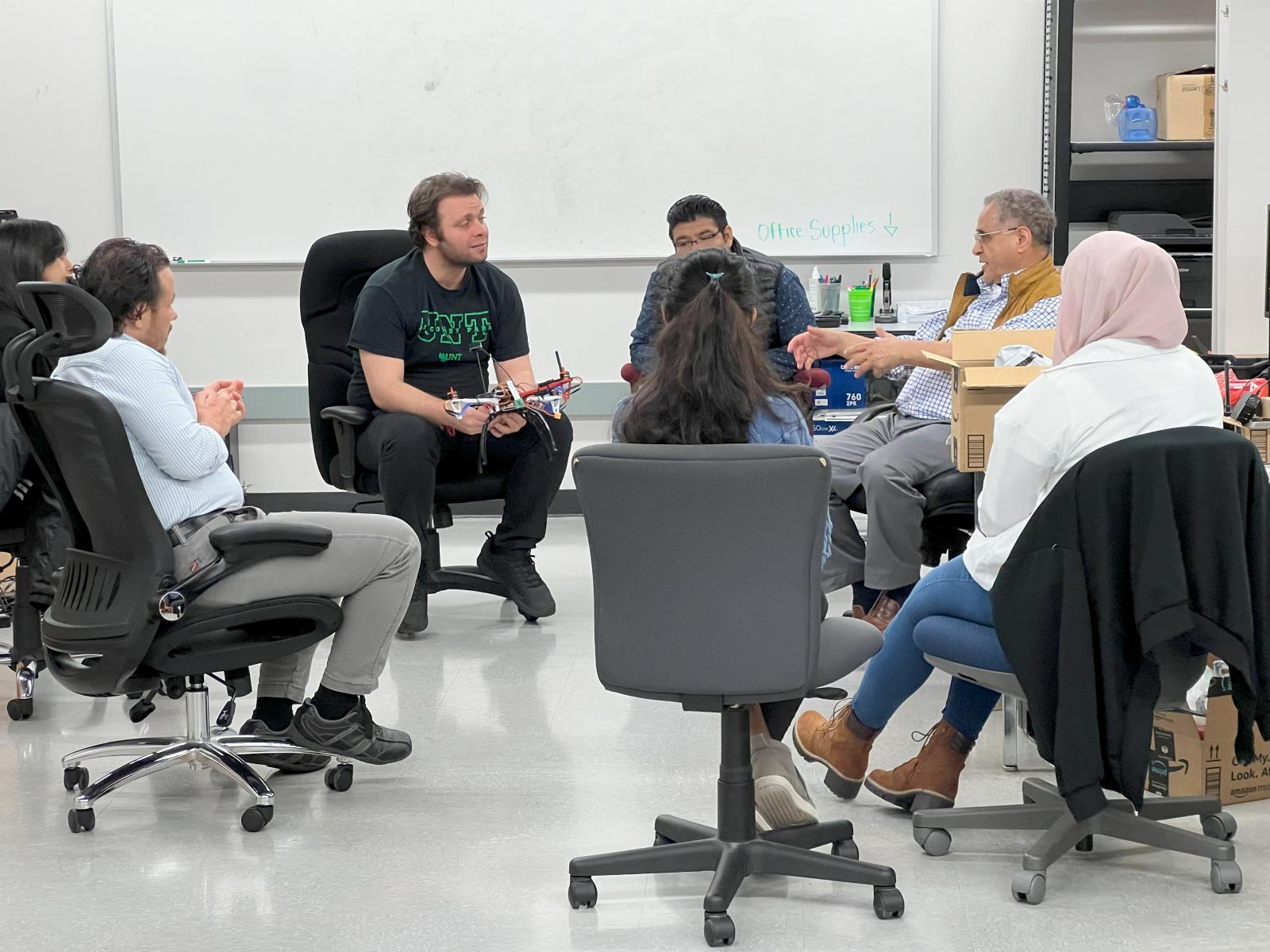
The OTZET project continues on as the Network Security Lab crew are moving forward with more paper submissions and more advances in their work. Dr. Cihan Tunc states, “We’re looking to build this research for further progression. [Amal Alshehri] is doing this for her final research.”
The Department of Computer Science and Engineering extends a huge congratulations to Amal Alshehri, Burak Tufekci, and Dr. Cihan Tunc on a job well done!
For more information on the Network Security Lab and the Smart CyberSpace group, check out their website links here:
Home | Network Security Lab (NSL) (unt.edu )
Welcome to Smart CyberSpace (SCS) at UNT | Smart Cyber Space (SCS)
For more information on Siemens, click here to access their website: Sustainability through cybersecurity | Siemens Innovation Ecosystem

IMAGES
VIDEO
COMMENTS
Finding and choosing a strong research topic is the critical first step when it comes to crafting a high-quality dissertation, thesis or research project. If you've landed on this post, chances are you're looking for a computer science-related research topic, but aren't sure where to start.Here, we'll explore a variety of CompSci & IT-related research ideas and topic thought-starters ...
Choosing a thesis topic is an important decision for computer science PhD scholars, especially in IoT. It is essential to consider topics related to learning, security, and management to ensure a well-rounded research project. It is essential to align personal interests with current trends in learning, management, security, and IoT and fill ...
In summary, it is important to keep in mind the following to choose an apt topic for your PhD research in Computer Science: Your passion for an area of research. Appositeness of the topic. Feasibility of the research with respect to the availability of the resource. Providing a solution to a practical problem. Oder Now.
To earn a Ph.D. in computer science, each student needs a bachelor's degree and around 75 graduate credits in a computer science program, including about 20 dissertation credits. Most programs require prerequisites in computer science. A graduate with a computer science master's or graduate certificate can apply their graduate credits toward ...
Students wishing to pursue a Ph.D. in computer science generally take 4-5 years to complete the degree, which usually requires 72-90 credits. Learners can devote their studies to general computer science or choose a specialty area, such as one of the following: Computer science. Algorithms, combinatorics, and optimization.
The computer science Ph.D. program complies with the requirements of the Cornell Graduate School, which include requirements on residency, minimum grades, examinations, and dissertation. The Department also administers a very small 2-year Master of Science program (with thesis). Students in this program serve as teaching assistants and receive ...
The PhD degree is intended primarily for students who desire a career in research, advanced development, or teaching. A broad Computer Science, Engineering, Science background, intensive study, and research experience in a specialized area are the necessary requisites. The degree of Doctor of Philosophy (PhD) is conferred on candidates who have ...
PhD in Computer Science. ... Pattern recognition, artificial intelligence, data mining, intelligent agents, computer vision, and data mining are topics that are all incorporated into the field of robotics. The Seidenberg School has a robust robotics program that combines these topics in a meaningful program which provides students with a solid ...
Course Requirements. The PhD degree requires 72 credits of formal course work, independent study, directed study, and/or dissertation research. In addition to the credit requirement, twelve courses are required for the PhD categorized as follows: four foundation courses, six elective courses, CS 2001 (Research Topics in Computer Science) and CS ...
In the Computer Science program, you will learn both the fundamentals of computation and computation's interaction with the world. Your work will involve a wide range of areas including theoretical computer science, artificial intelligence and machine learning, economics and computer science, privacy and security, data-management systems, intelligent interfaces, operating systems, computer ...
As a PhD candidate, you will share in the excitement of discovery as you collaborate with our faculty on cutting-edge research. You will also acquire strong independent research skills and begin to develop your own reputation as a member of the research community. Because the advisor-graduate relationship is the cornerstone of a successful PhD ...
The Computer Science Department PhD program is a top-ranked research-oriented program, typically completed in 5-6 years. There are very few course requirements and the emphasis is on preparation for a career in Computer Science research. Eligibility. To be eligible for admission in a Stanford graduate program, applicants must meet: Degree level ...
Stanford University. PhD in Computer Science. Stanford University is one of the most famous research institutions in the world, and its Computer Science programs have been ranked second in the USA. This PhD program involves a research rotation scheme where students participate in different research groups during the first year.
We're thrilled that you are interested in our PhD program in computer science! This page provides an overview of the application process, some guidelines, and answers to specific questions. Please check our FAQ before emailing [email protected] with any questions not answered here. Our program accepts a large number of applicants each ...
Welcome to the fascinating world of PhD topics in computer science, where innovation, intellect, and real-world applications converge to pave the way for groundbreaking research.In this world of limitless possibilities, computer science PhD topics offer an unparalleled opportunity for aspiring researchers to delve into cutting-edge domains, unleashing their creativity to address the pressing ...
PhD; PhD Theses. 2023 Kristo, Ani ... Reliable and scalable variational inference for nonparametric mixtures, topics, and sequences (7.1 MB) • Erik Sudderth, advisor Leiserson, Mark ... Computer Science at Brown University Providence, Rhode Island 02912 USA Phone: 401-863-7600
The high cost of a graduate degree can make postsecondary education seem out of reach for many. Total tuition for the programs on this list costs $57,000 at Capital Tech and around $59,000 at NU ...
PhD in Computer Science is a 3-year long doctorate level course in computer science and its related aspects. PhD in computer science topics of study includes Research Methodology, Data Mining, Machine Learning, Rough Set Theory, etc. Individuals are required to take entrance exams to get admission into top colleges in India.
Perform a limit study. Perform a quick limit study before sticking with a project. A limit study includes in-depth analyses of implicit assumptions we make when coming up with an idea, a related works search, and the potential of the work if everything goes well. A great limit study can itself be a publishable paper. An example can be found here.
However, the topic should also be chosen on market demand. The topic must address the common people's problems. In this blog post, we are listing important and popular Ph.D. (Research) topics in Computer Science. PhD in Computer Science 2023: Admission, Eligibility
Computer science is denoted as the study based on computer technology about both the software and hardware. In addition, computer science includes various fields with the fundamental skills that are appropriate and that are functional over the recent technologies and the interconnected world. We guide research scholars to design latest phd topics in computer science.
If you wish to do Ph.D., these can become interesting computer science research topics for a PhD. 4. Security Assurance. As more sensitive data is being transmitted and kept online, security is our main concern. Computer science research is crucial for creating new security systems and tactics that defend against online threats.
Computer Science Research Topics for PhD is a full research team to discover your work. It is a desire for the up-and-coming scholars to attain the best. Without a doubt, you can know the depth of your work.To fix this issue, we bring our Computer science research topics for PhD services. In computer science, we will explore 145+ areas and ...
After all, she's a graduate student studying violin performance. But she also teaches violin to others, and the program she was demonstrating might someday help those she teaches to play even better. ... a Ph.D. candidate at the Department of Computer Science, and is the perfect example of how the University of Maryland is building bridges ...
Find breaking science news and analysis from the world's leading research journal.
The computer science and mathematics curricula prepared me well to continue education in a Ph.D. program, and I also felt more prepared for this through visiting the Career Center. At Dickinson, I've had the opportunity to take interesting classes that blend my passions for the arts, music and tech ...
9/27/23 Computer Science and Engineering; 3/12/24 Electrical Engineering; 12/22/23 Engineering Education; 4/17/24 Industrial and Systems Engineering; 5/30/23 Materials Design and Innovation; 4/12/24 Mechanical and Aerospace Engineering
Several of the graduate programs in Virginia Tech's College of Engineering have earned coveted spots in the top 20 of the latest U.S. News & World Report rankings.Notably, the computer engineering program rose eight spots, from No. 23 to No. 15. The university's goal to seek solutions to the world's most complex problems through research and innovation is demonstrated throughout the ...
Study co-author Jeff Maltas, PhD, a postdoctoral fellow at Cleveland Clinic, uses computer models to predict how a bacterium's resistance to one antibiotic will make it weaker to another.
Last month, research from our Network Security Lab received the winning team award for the 2024 Siemen's Tech Sustainability through Cybersecurity Challenge.PhD candidates, Amal Alshehri and Burak Tufekci, as well as Assistant Professor, Dr. Cihan Tunc, were one of the finalist research groups (out of 22 projects) and their project "OTZET: Operational Technology Zero Trust Engine for ...